#the narrative and thematic set up is entirely there and they just shove it in the bin lmao
Text
it's pretty wild to me that people don't see that aang running off to save katara in CoD is his luke in empire strikes back moment, where he runs headlong into his want and attachment and he's narratively punished for doing so and not learning his lesson - aang runs after katara despite guru pathik's warning, like luke runs after leia and han from yoda on dagobah despite yoda's warning; similarly, as a result, things go to hell in ba sing se like they do on bespin - aang enters the avatar state before he's ready and gets killed, and ba sing se falls to the fire nation, luke fights vader before he's ready, loses a hand, and symbolically commits suicide after vader tells him he's luke's father.
the difference between their character arcs is that george lucas and co. actually went thru with luke's hero's journey and understood the fundamental difference between attachment and love, whereas I don't think bryke understood this difference and then dropped this from aang's arc pretty much completely and replaced it with aang digging in his heels into his want and attachment and he gets rewarded with energy bending from a lion turtle, the avatar state from a random pointy rock, and his forever girl from the self-indulgent white men that couldn't bring themselves to give their hero a compelling character arc that meant he might not have gotten everything he wanted at the end.
#the wasted potential of aang's arc gets to me so bad#the narrative and thematic set up is entirely there and they just shove it in the bin lmao#it especially irks as someone raised buddhist and dealing with writers that invoke these themes out of a fascination#with the religion and philosophy but then a complete unwillingess to actually commit to what those themes require of the character arcs#anyway sorry to say it#but zuko's arc does a better job embodying buddhist themes than aang's does in the end#despite all misappropriated aesthetics to the contrary#aang critical#but its really the writing like i LIKE aang i love his potential i hate how self indulgently he's written by the end of the show#atla critical#meta*#holly talks bs#also yes it would've been better narratively for aang katara zuko to the go the way of luke leia han#even if katara couldn't have been revealed as aang's surprise secret twin lmao#the thematic conceit of the triangle is the same in that luke and aang get over their infatuation with the first pretty girl he sees#and becomes the hero he needs to be#meanwhile hanleia and zutara are saving each other and being cool and kissing#anyway
310 notes
·
View notes
Note
Hi! I know that a lot of people ship Sam and Rowena. However, my viewing experience did not warrant the ship. I am now trying to actively parse out why people see them coming together. Do you have any episode recommendations that are foundational to the relation between Sam and Rowena? In case, you feel that this ask may get nasty or start discourse, you need not post it! Thank you :')
Hi there! I've been frowning at this for a couple days, wondering how best to reply. First off, back in December 2019 (when I was EXTREMELY distressed with Rowena's apparent fate as Queen of Hell, and absolutely convinced that she had earned redemption by the narrative-- not even specifically via some relationship with Sam, but for HERSELF, that she didn't deserve to be trapped forever in Hell after literally sacrificing herself to save the world... I mean... Sam escaped that exact same fate, yes? He got out of the Cage. He wasn't doomed to rot in Hell for the rest of eternity for literally doing the exact same thing to stop the apocalypse...), I wrote an essay called The Witch and the Winchesters that was more about Rowena herself than about Samwitch as a ship. It's how I think of her as a character, first and foremost. And I don't know if it's possible to understand how I see their relationship (or the potential for their relationship) without understanding how I see HER. For herself.
As to the rest, specific episode recommendations that set up her relationship with Sam, those go back to s10, when she was working with Sam (rather against her will, especially once Sam chained her to the table) to save Dean from the Mark. I think the best example of their relationship being something more from that era was 10.19 The Werther Project. Because even though Rowena is there for a lot of that episode, we also learn she was not real. She was the hallucination Sam suffered under the influence of the Werther box. She was, in other words, what the spell latched on to in Sam with the intent to drive him toward his own death. For Dean, that spell-activated bit of himself was represented by Benny. Parallels! She had already taken up residence in Sam's psyche by this point, whether for good or ill. The show has transitioned her to Benny-for-Dean status, at least thematically.
Obviously 10.23 should be on this list. This was the parallel to all the Love At First Stab nonsense re: destiel. She literally... stabbed... her first love... For Sam. Not like she had a choice, but this was the point where they truly became enemies instead of just mutually interested slightly antagonistic acquaintances. And yet... gradually over the course of the next four seasons (because they will have four more seasons to evolve their relationship), she experiences a character growth arc that roughly parallels Cas's entire arc of self-discovery, battling his past demons, choosing his own family, and finding contentment with himself. And I absolutely HATE that Rowena remained unredeemed, because that parallel with Cas? Yeah... there's a lot of reasons he got perma-shoved into the Empty...
11.03 has her reluctantly helping them save Cas (from the spell she'd cast on him in the first place, but she did save him), and the banter between her and Sam is just super antagonistic. Love that for them. It's very early Dean/Cas. Or maybe s6 Dean/Cas.
11.09 and 11.10 begin to show us a deeper look at Rowena, and how horrifyingly misguided her efforts were. After that, we don't see her for most of a season, until we find out about her resurrection spell. But when she comes back, she is Changed™ in some pretty fundamental ways, scarred by her experiences. Every episode with her beyond this point-- and I'd say especially those written by Yockey and Glynn-- demonstrate this change. This desire to redeem herself, and the kindness Sam shows her during this process.
12.11 Regarding Dean not only gives us a better look at her history in a more pointed way, it shows just how much he has changed and WANTS to change. For herself, but also because Sam just keeps putting his trust in her. She wants to be worthy of it, even if she doesn't feel she ever could be.
13.12 Various and Sundry Villains seemed to be going hard on building a common footing between her and Sam. Even as Dean protested, Sam continued sympathizing with her and doing whatever he could to support her. Even if it would eventually put them in danger.
13.19 Funeralia was the moment I personally began to see their relationship had fundamentally shifted. Sure, the final scene of the episode involved Sam, Rowena, and Dean... but the episode literally interwove Sam and Rowena's fates, which would become the eventual method of her self-sacrifice in 15.03 in the exact way Dean and Cas's fates were interwoven and came to fruition in 15.18.
And how can we leave off 14.14 Ouroboros? I mean, the entire episode has her paired with Sam while Dean's paired with Cas. And then she literally trades herself to Michael to save what she considers her family now? Very Winchester of her. Go figure.
15.02 and 15.03 are... heck to me in retrospect, it looks like bucklemming deliberately trying to stamp out the relationship between her and Sam in 15.02, and Bobo coming in for the kill with 15.03, in direct parallel to "breaking up" Dean and Cas. Can you see why I was absolutely DETERMINED that Rowena be saved from her fate? Because if she wasn't, neither would Dean and Cas be saved? Yeah... look how that turned out... >.>
She manages to have a lot of conversations with Sam about stuff even Sam says he's never talked about with anyone else-- including Dean. They get each other in profound ways. In ways that nobody else on the planet can really even understand.
I get how a lot of people chose to see her more as a "mentor figure" for Sam and his witchcraft abilities. She did leave him her worldly possessions when she died, after all, effectively handing over her legacy to Sam. But ignoring all the rest of it, the personal, emotional, and cosmic connection between them just... starts to look like forcefully denying the potential for a deeper relationship between them. Because 15.06 Golden Time looks a LOT different if you remove your Saileen ship goggles and watch it with the understanding that Sam was still mourning Rowena's loss even three episodes later, and KNOWING that Chuck was manipulating Eileen's return, that Chuck wrote that partial spell for Sam to complete to resurrect Eileen. Because just like Chuck was grumpy about Cas being helpful to Dean, he was grumpy about Rowena being helpful to Sam. I have no idea how it was even possible for people to watch that episode as a purely unproblematic return of a favorite character.
Please know that I adore Eileen, and that the narrative had convinced me by 15.18 that she and Sam would've been happy together, that he really loved her, and that they had been working on building a future together. And even independently of any ship, I was still angry about Rowena's fate. I mean, in my finale rewrite, Revenge of the Text, she was the first person Jack visits after deciding how best to put the universe to rights. It had zero to do with shipping her with Sam anymore, and I'll probably always mourn the loss of their romantic potential, but I do give her the chance at true redemption, friendship, and family that the narrative denied her.
So really, at the end of the day, I care more about her than I do the lost potential for a ship. But the ship would've been both adorable and cosmic...
#rowena#samwitch#saileen#but yeah... saileen is cute but this is profound...#lol that was an old old tag that popped up... i have no idea what it even linked back to but there you go#obviously as we watched the rest of canon unfold i saw saileen develop into a cute and happy potential relationship#but i will never really forgive the show for just abandoning rowena in hell and walking away...#i would've been content to know she'd been saved after everything even if she didn't end up with sam#but the way her rule over hell was portrayed for the rest of the series as tenuous and possibly not even legitimate... well#that just made it even worse. and because of four years of paralleling her personal arc to cas's...#well you can see why her failed salvation was one of the main reasons i can't accept that cas was ever saved from the empty#spn 15.20#gotta stick that tag on there now i guess >.>
26 notes
·
View notes
Text
How to meet (or reunite with) your Digimon partner, according to 02
Here’s a post dedicated to those of you who are worried or sad about Kizuna’s premise, or how the way it ends is supposed to lead up to the 02 epilogue, and are thinking of that elephant-in-the-room question of “so then how do they get their partners back?” I’m not the Kizuna staff, so I can’t say anything for sure, but I can tell you that 02 gives us some interesting leads here!
You’re probably thinking “weren’t Kizuna and the problem of partnership dissolution made after 02? Isn’t this an Adventure movie? Why are you bringing 02 into this?” Ah, but you see, that might be true if you’re thinking of it on a technical plot level, but 02 as a series isn’t as thematically displaced from Kizuna as you might think, especially when the exact same real-life incident about a kid skipping grades, the one that literally was the foundation for 02′s creation to begin with, was brought back 20 years later for Menoa’s backstory. Certainly, a lot of the plot points introduced in Kizuna are new to it, but the themes and things it wants to say about self-acceptance and how to pursue happiness have very deep parallels to 02 -- which means that it’s not much of a stretch to think that some of the answers to the questions presented in Kizuna can be found in 02, too.
While it’s true that “getting your partner back from adulthood existential-crisis induced disappearance” is not a problem that necessarily presented itself in 02, remember that we’re dealing with a lot of theme parallels here -- a Digimon is part of one’s heart, and the central characters of both narratives (Ken and Menoa) had backstories that came from the same real-life story, one that warns that pressuring a kid into “adult” situations that they’re not emotionally prepared to handle will mess them up and cause them to lose their sense of self. The answer to the question of “how to get a partner back” in Kizuna was only pursued by the very scientifically-minded Menoa, who mashed keys on the keyboard and played around with egg data to get it to work, but this is Digimon, where these kinds of fateful meetings and evolutionary moments happen because of the heart, and everyone depicted lost their partners for reasons related to mentality and not science (remember, Menoa lost Morphomon at 14). Has Menoa done any real introspection in the last eight years? Probably not.
So, back in 02, when Ken did lose his sense of self, he eventually came back to his senses and decided to reclaim Wormmon. Thanks to how the plot worked, Wormmon merely “died” and was set to be reborn at the Village of Beginnings, but...
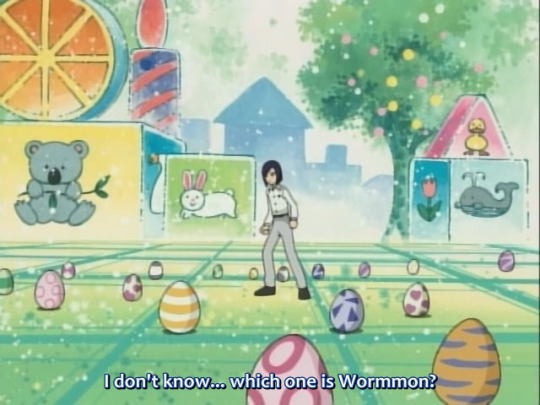
Just being reborn by the mechanics of the plot wouldn’t do it. Ken would never be able to find Wormmon again until he accepted something else, which is...


...himself. Everything good and bad about him, what he’d done in the past, how he has to move on with that, and how to move on with the person he actually is instead of the shell of the Kaiser. And with that, he is led to Wormmon, and is able to start the process of repairing their relationship.
So the point made here in 02 episode 23 is: one will only be able to be reunited with their partner if they can accept everything about themselves and become able to move on -- something that Menoa, who forced herself into the role of an “adult” in the hopes of getting more acceptance among her peers and eventually drowned herself in nostalgia, was most certainly not doing over the course of the movie.
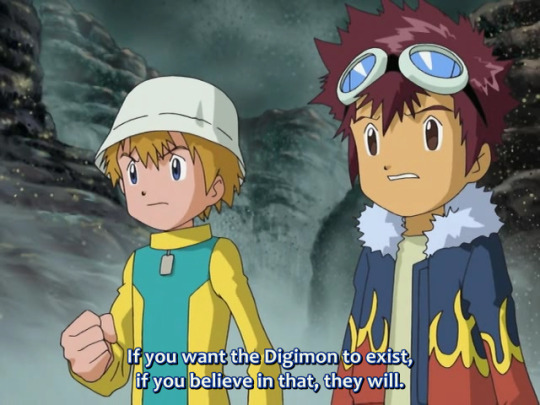

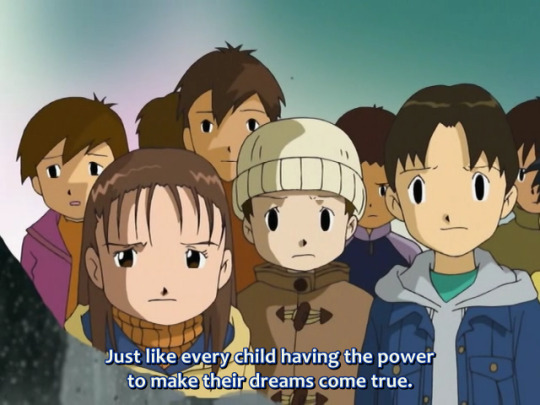
So anyway, we get to 02 episode 50, and the parallel becomes even less subtle -- “a Digimon partner” is given a very direct correlation to “one’s own personal aspirations and dreams”. If you look back at the entire plot of 02 up to this point, with Ken and the Dark Seed children, all of them have been shoving aside “themselves” and “what they wanted to do” in an effort to please others -- to become well-behaved, studious, athletic, whatever society expected of them, instead of what they wanted to do.
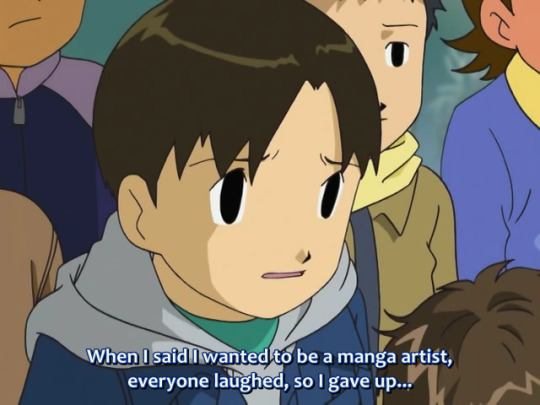
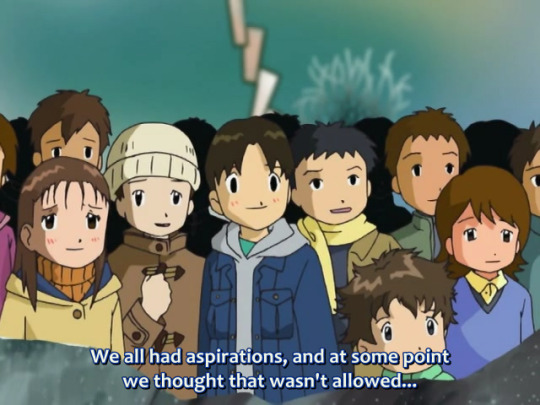
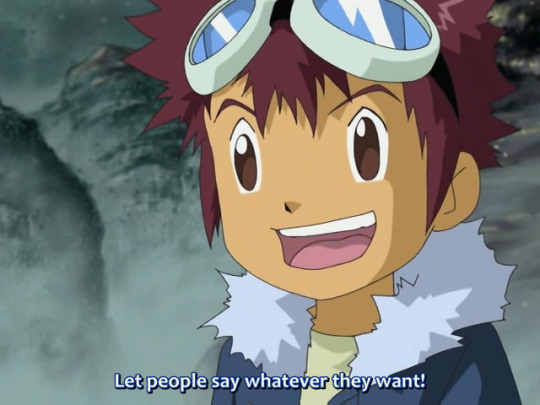
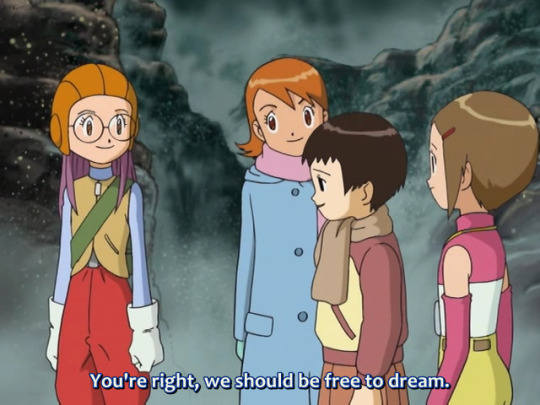

So all of the kids admit all of the embarrassing, “undignified” dreams that they’d been holding back because they’d felt that they weren’t “allowed” to have them (following Daisuke’s shameless example of admitting that he’s fine with doing something as simple as running a ramen shop), and are encouraged to be a bit shameless about it and forget what society wants them to do, instead of what they want to do. The word “belief” is brought up a lot in this episode -- it’s not just having dreams, you also have to really, truly believe in your ability to make them happen and have the gusto to follow them without restraint.
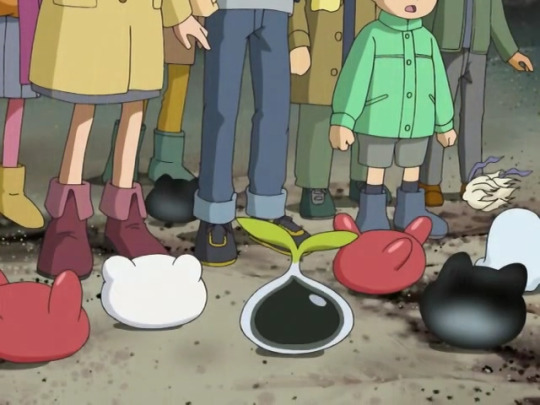
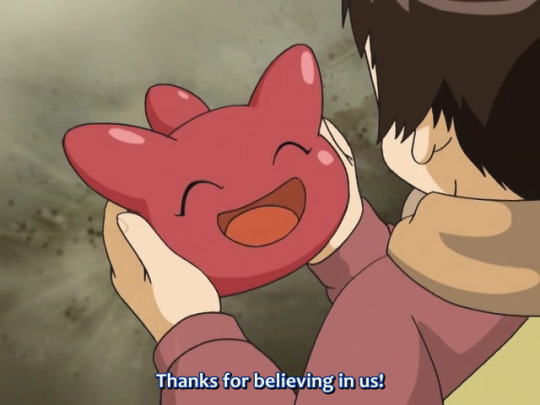
And so, this strong resolution to have “belief” allows their partners to spontaneously manifest in front of them -- and it’s all but stated that said “dreams” and said partners are equivalent, and even implied that their partners had always existed in their hearts in some form, just not able to truly appear until they fully accepted themselves. Or, in other words, you will only be able to meet your partner when you embrace everything about yourself and what you want to do, regardless of what others think or what society expects of you, and have the will to pursue it.
(By the way, yes. Spontaneously manifest. Even if most of Adventure/02 had been defined by concrete mechanics for the most of it, in the end, this is still a narrative about the human heart before anything else.)
And guess who else learns this lesson by the end of the episode?

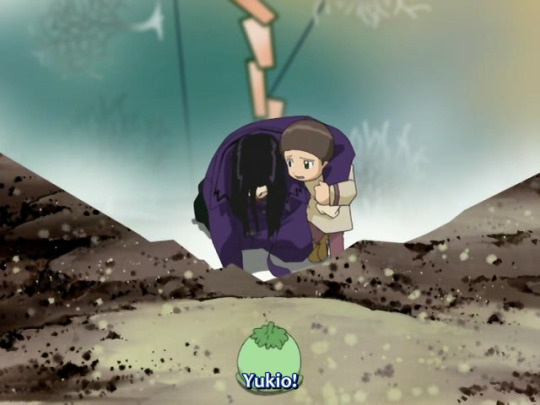

When Oikawa, who had been childishly (hmmm) chasing after shallow symbols of his past in order to get it back (hmmmmmm) because he considered himself too much of a “tainted adult” (hmmmm, sounds familiar) back in 02 episode 48, finally comes to realize what his actual mistake was and that he should have been more free about pursuing his dreams instead of accepting Chikara taking them away from him and Hiroki, Oikawa is finally able to reconnect with the partner he’d “lost” all of those years ago (hmmmmmmmmmmmmmmmmmm). So, again, you will only be able to reunite with your partner once you accept everything about yourself and what you should do from here on out.
(Hey, fun fact: Pipimon also spontaneously appeared in front of Oikawa the moment he accepted this. Although the exact specifics of the current “adulthood” issue were probably not conceived until Kizuna, “not being able to reach a partner that you once had due to cutting your own dreams off” has precedent!)
Moreover, Menoa’s backstory seems practically engineered to make sure that she never witnessed this nor learned this lesson -- she lost her partner “eight years ago”, in 2002, the exact same year the events of 02 took place. Assuming that she lost said partner in the middle of the year (her flashback seems to take place in spring or so, when university admissions results are issued), this would have prevented her from participating in the “world tour” battles around the world in 02 episodes 40-42 and engaging with Daisuke and friends, and particularly from joining in the final fight with BelialVamdemon and therefore witnessing what happened with the Dark Seed children and Oikawa. Which means that her ability to get this cynical about partnership dissolution being “inevitable” and that there’s no way to regain your hopes and dreams was enabled by the fact that she didn’t get to learn the lesson that the Tokyo Chosen Children did all those years ago...
Let’s look at the four who lost their partners over the course of Kizuna. Where were they at the time they lost their partners?
Menoa: Considering herself spurned by other people who “look at her weird” and desperate to “live on her own two feet” and “be useful to the world”, forced herself into the role of an “adult” by getting herself to skip grades into a university setting she was unprepared for, for the sake of recognition more than anything, and ended up living a very lonely life
Taichi: Isolated himself from others for the sake of living independently and “having his own life to live”, losing focus about anything he wanted to do, and allowing himself to get slowly disconnected from Agumon
Yamato: Developed a sense of detachment from his old hobbies and started living life for a “grace period” due to lack of real focus on what he wanted to do
Sora: Started forcing herself into “obligations” to succeed her mother in flower arrangement and from her Chosen Child duties, to the point she isolated herself from others and started losing control over herself
(Funny thing: a big part of 02′s story was about finding support in others and fostering your relationships, and here we are with four people who are slowly “isolating” themselves from others...)
It’s not about “becoming an adult” and losing your partner. It’s about shoving yourself into the societally-enforced standard of an adult and losing yourself in the process, and therefore losing your ability to see your partner.

And so, by the end of Kizuna, all four of them have lost their partners -- but we also see the characters we know and love starting to follow their way to what we know is the 02 epilogue, through some very unsubtle hint dropping (retroactive hints to the careers we’re already aware of, such as Taichi’s future in diplomacy). Which means that the eventual existence of the 02 epilogue is in itself the answer to the question, because the epilogue is: everyone found what they wanted to do and pursued it, and therefore everyone eventually figured out their personal aspirations and what they wanted to do, and were able to accept and pursue it, which was established earlier as the key to meeting your partner.

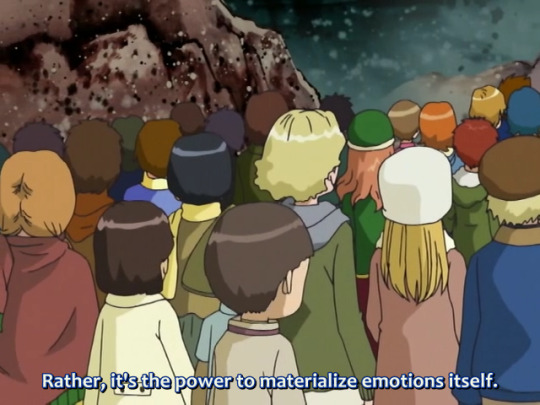
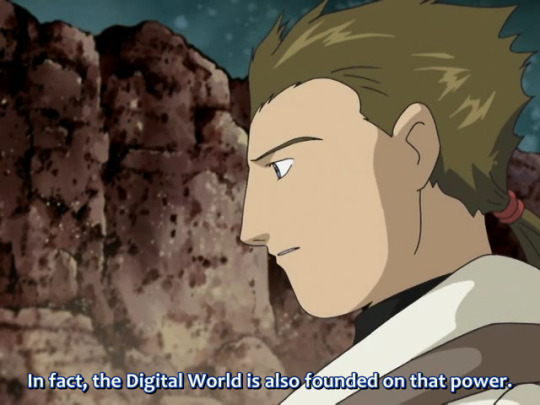

By the way! It’s also revealed in 02 episode 50 that the Digital World itself is at least partially formed on “the power to materialize emotions” (both positive and negative), which is the explanation for so many phenomena over both Adventure and 02 being related to the human heart, and presumably is also why Digimon partners can even exist to begin with (they’re literally supposed to be a part of the inner self, so the power of the Digital World is what “brings them out”). All four “disappearances” on record happened with all four of them in the real world, fixated on their obligations to society and attempting to turn themselves into model citizens, but all of the above “meetings” with partners in 02 -- and Menoa making true “contact” with Morphomon (inside Eosmon) for the first time since her disappearance -- also happened in the Digital World, the world of idealistic dreams, personal aspirations, and the materialization of people’s emotions.
117 notes
·
View notes
Text
It’s Cold in that Fridge: The Case of Nakari Kelen
Since The Case of Mara Jade has been doing the rounds again, I’ve finally gone back to this post that has been sitting in my drafts for literally years. So let’s honour this absolute badass who deserved better:
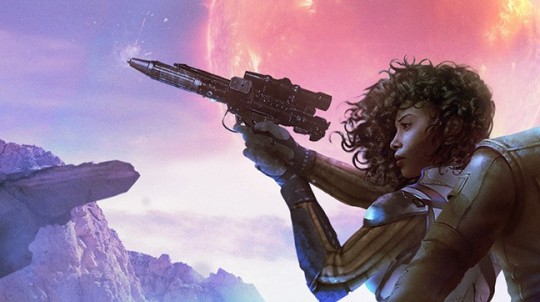
Once upon a time, the Star Wars universe was but six films (and a tv series) in the story of the Skywalker family. But beyond George Lucas’ story was an absolute boatload of books, comics, games, and other materials that made up the Expanded Universe. When Disney purchased Lucasfilm and the rights to the Star Wars saga, everything in this universe was decanonised and deemed “Legends” - some aspects of this universe were retained or re-purposed, others sit in Disney’s figurative vault and will likely never see the light of day (and seeing how the ST turned out, maybe that’s for the best).
But this transition between Legends canon and Disney canon was not so simple, because the nature of publishing meant that there were novels approved during the time of Legends canon that would be released in the time of Disney canon. In particular, there had been the planned trilogy “Empire and Rebellion”, set between A New Hope and The Empire Strikes Back, with each novel from the perspective of one of The Big Three.
Razor’s Edge (Leia) and Honor Among Thieves (Han) were released prior to the Great Canon Split of 2014. But while the Luke-centric novel had been planned, it was not due to be released until well after the Split. So Heir to the Jedi (so called as an homage to the Legends progenitor Heir to the Empire) became one of the first books of the Disney canon.
What does this background have to do with Nakari Kelen? Perhaps nothing, but I do wonder how the writing process was affected by the shift from Legends to Disney - was the novel a relic of the old EU with any reference the LFL storygroup didn’t like excised during editing, or was it a trendsetter for the new EU, a Sign of Things to Come?
The most salient point being, of course, that Nakari Kelen - like so many love interests before her - was not allowed to go along her merry way at the conclusion of the novel, but was shoved into the fridge.
If there was one constant of the Legends EU, it was that Luke Skywalker’s love interests couldn’t catch a break. Mara Jade naturally lasted the longest relationship-wise, with almost twenty years of marriage to Luke before some bright spark decided she had to go (as per the aforementioned case study). But before Mara there was Jem, Shira Brie, and Gaeriel Captison (who came close to escaping the curse), and in the Legacy of the Force series they brought back sole survivors Akanah and Callista, only to kill them off for good too (and rather brutally, if I may add).
So perhaps when Kevin Hearne began writing HttJ within the confines of the Legends continuity, he was merely sticking to the status quo, or perhaps once subsumed by Disney they needed to make sure Luke's slate was clean (so to speak). And I can’t put all the blame on Hearne since I don’t know whether it was his idea, or LFL mandated - but regardless it was a poor decision.
The root cause of fridging, imo, is limited imagination. How best to cause your male protagonist pain if not kill off someone they love, or at least have strong feelings for? The answer is of course, easily. But I’m getting ahead of myself.
The Luke Skywalker of HttJ is fresh from his victory in ANH, a lieutenant in the Rebellion: young, not dumb, and full of...
Nakari Kalen is an absolute Queen a civilian volunteer and crack-shot sniper who loans her ship Desert Jewel to the Alliance. Luke is immediately attracted to her, they bond over a mutual love of fast ships and leaving behind desert home planets, and engage in the inexpert flirting of two nineteen year olds while also risking their lives several times over.
I want to make it clear: I actually really like this book. It's a breezy read, almost serialised as The Early Adventures of Luke Skywalker, and is ofttimes genuinely funny. And credit where it’s due to Hearne, many of of the supporting roles in the novel are female. Other than Nakari, there's Soonta, the Rodian who gives Luke her uncle’s lightsaber, Sakhet the Kupohan spy, and the Givin cryptographer/math genius Drusil Bephorin. In a genre where male characters are often the default for these kind of roles, it was nice to see, but makes the regressive fridging of Nakari even more egregious.
Luke and Nakari make a good team fighting brain-sucking monsters and Imperials, but more importantly they have fun together - she encourages him to work on his Force skills, and he successfully moves objects with his mind for the first time (leading to Nakari adorably dub him "a little noddle scooter"). It's a very sweet, if brief, relationship, and a respite from the danger of the mission. They spend the night together (leaving the reader to decide exactly what happened behind closed doors), and share a kiss before splitting up to try and escape bounty hunters. No prizes for guessing what happens to Nakari immediately after she received the Skywalker Kiss of Death.
I assume there were two motivating factors for why Hearne and/or LFL couldn't let Nakari live:
1. If she survived, fans would wonder why she doesn't appear in ESB/subsequent material.
I recall this bandied about on forums back at the time of the book's release, and to that I say - so what? Fans are always going to wonder, and try to paper over the gaps in canon, to make up their own headcanons to explain any any perceived inconsistencies. It's certainly no reason to kill someone off.
It is in fact possible for two young people to have a romance that just fizzles, or doesn’t work out for whatever reason - it should not require great maneuvering or explanation. If Nakari doesn’t show up in the next book in the timeline, what about it? The reader is smart enough to assume she and Luke broke up, decided to just remain friends, whatever. But it seems that the only way for a female character to exit stage left is for her to die, which is bullshit.
And actually, there's no reason why she couldn't have shown up again. ESB and RoTJ cover a month and a few days, respectively, of Luke's life - just because there was no mention of Nakari doesn't mean she didn't exist at that time, whether or not she and Luke were an item. She could have made an appearance in a subsequent novel, or Rebels, or the comics - she could have become a recurring character, showing up when the Rebellion needed her, or - heaven forbid - even have her own comic/book/show! Her existence in Star Wars canon didn't need to begin and end with Luke Skywalker, merely to service his plotline and backstory and abandoning the richness of her own.
No, the only reason Nakari had to die was to facilitate this:
It was a blow to the gut, realizing what that sudden absence meant. I hadn't seen it with my own eyes, but I had felt Nakari's life snuffed out through the Force, and into that void where she had shone anger rushed in - anger, and a cold sense of raw power and invincibility...I took a step to join in the hunt but stopped, breathing heavily, unaccountably sweating even though I felt so cold inside and the power of the Force roiled within me... I shook with emotion and power, and none of it felt the way the Force had before...I saw what kind of space it was , a black hole that would always be hungry no matter how much I fed it. I might never feel warm again if I didn't get myself under control.
Luke feels the dark side and is tempted by the boost of power it offers him, but immediately identifies it as dangerous and unnatural. I can understand why Hearne wanted to include this - it is a book of firsts after all: Luke's first solo mission, his first time using telekenisis, and ending with story with his first experience of the dark side makes sense. But it wasn't necessary, which leads to:
2. How to push Luke to touch the dark side without killing someone he has romantic feelings for?
Also, obviously, shite of the bull (or nerf, if you prefer). Even if this brush with the dark side was absolutely necessary for the novel's climax, there's any number of ways it could be achieved. At this point, Luke is fresh from losing important people in his life - Owen and Beru, Ben, and Biggs - lumping another death on top of that a narrative trick for Luke to react not only to losing Nakari, but the others as well. But it's cheap, the first card in the deck, and why not show a bit of imagination? Luke is young and inexperienced enough at this point that any number of things could be the catalyst - the whole book he's struggling with his growing powers, why not try and reach too far in the firefight with the bounty hunters, his anger and frustration with himself in not doing enough trigger the dark side temptation? It would work thematically and doesn't involve a fridging that ultimately has very little payoff.
Because Nakari is killed less than ten pages from the end of the book - afterwards Luke grieves, but ultimately chooses to honour her memory and be grateful for what he learned with her, recommitting to becoming a Jedi. It's all very surface level, and once again a female character's death facilitates a male character's development. Was it so imperative that Luke lost someone he cared about as part of this story? Sure, this was a time of galactic civil war, and it's far from unrealistic that these stories have a high body count, but who to make collateral damage remains an authorial choice, and in this case Nakari Kelen was (a) a female character of color, (b) a love interest of the protagonist - not just of this book, but the entire Original Trilogy.
I don't know to what extent (if any) race had to play in the decision. I'm sure there was a segment of the fandom absolutely livid that Luke Skywalker kissed (and maybe had sex with) a black woman. Was her death LFL hedging its bets, or demonstrative of the general lack of attention/respect they show their characters of colour?
In any case this was a chance to stand out from the old EU and it's fridge full of Luke's dead girlfriends, but instead they chose to introduce and kill off Nakari for the sole purpose of Luke's manpain and character development, and that's gross.
And then there's this:
A grisly yet reliable fact about custom bounty hunter ships is that you can always count on them to have body bags stashed somewhere for the easy transport of their kills. They often have built-in refrigerated storage, too.
NAKARI IS KILLED AND LITERALLY STORED IN THE FUCKING FRIDGE I COULDN'T BELIEVE WHAT I WAS READING.
I really hope this was unintentional on Hearne's part, because yikes. He was halfway there, this book was full of interesting female characters who had agency - Drusil in particular was a delight with her super math and inability to understand human interaction. Nakari was full of life and fun - capable but relatable, showing a different side of the Rebellion and those that suffered under the Empire's rule. Fridging her in her first appearance is considerably more vile, because it reduces her to a footnote of Luke's story, a plot device to Help Him Grow, rather than a springboard to tell more of her own story.
Because Nakari was a compelling character ripe for spinoff potential. I would absolutely have read or watched her continued adventures, juggling missions for her father's Biolabs company and trying to aid the Rebellion, shooting her slug rifle and cracking wise, maybe even finding a way to amplify her mother's song Vader's Many Prosthetic Parts to really stick it to the Empire, or try and free the political prisoners on Kessel.
The old EU was made great by allies and enemies of Our Heroes showing up again to help or hinder them, and/or branching out into their own material. We fell in love with them, and followed their stories even as they diverged from the main saga, eager to read more about their lives.
Nakari Kelen never got that chance. In many ways, she exemplified what Disney Star Wars was to become: an exercise in wasted potential.
#star wars#star wars meta#heir to the jedi#nakari kelen#luke skywalker#fridging#it's cold in that fridge#star wars expanded universe#nucanon
63 notes
·
View notes
Text
Viddying the Nasties #37 | Possession (Zulawski, 1981)
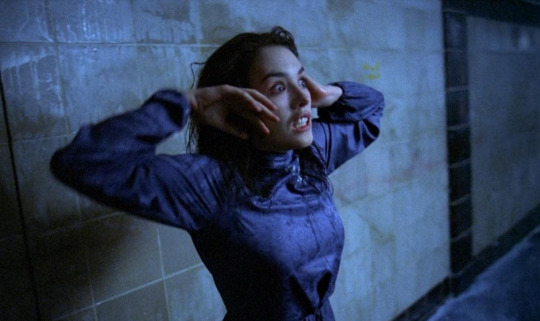
This review contains spoilers.
Andrzej Zulawski's Possession is a movie I'd somewhat been dreading revisiting. When I'd seen it all those years back (on YouTube, split into two parts if I recall correctly, as the DVD had been hard to come by in those days), despite being greatly moved by the experience, I'd also found it an extremely exhausting film to sit through. It's a tortured divorce melodrama (among other things) that starts at 11 and only goes up from there. Lots of shouting and screaming, physical abuse, kicking around chairs and tables. The movie is not what I'd call an overtly pleasant experience. Watching it now (on a Blu-ray from Mondo Vision, a substantial upgrade from my original format), while I won't characterize my previous impressions as inaccurate, I was able to better appreciate how the movie modulates this tone, acclimatizing us to its fraught emotional space. The movie starts off in the realm of a normal, bitter breakup, with the husband having returned from a work trip only to learn that his wife is leaving him and struggling to make sense of it, his frustration and anger stemming as much from the fact of her dissolving their relationship as his inability to comprehend her motivations. It isn't really until the half hour mark that it asks us to dive off the deep end with it. The husband hits his wife in the middle of a fight, follows her onto the street as she tries to halfheartedly throw herself onto the path of a truck, which then drops its baggage in an almost comical bit of stuntwork, their squabble ended when the husband becomes surrounded by children playing soccer and joins in. Any one of these by itself is nothing out of the ordinary, but Zulawski assembles them into an off-kilter crescendo, and does away with any sense of normalcy for the rest of the runtime.
That this approach works as well as it does is largely thanks to Isabelle Adjani as Anna, the wife, who spends the aforementioned scene looking like a vampire in cat eye sunglasses and blood streaming down her grimacing mouth. She delivers perhaps the most bracingly physical performance I've seen in a movie, but again this is something I'd maybe underappreciated initially in terms of how finely tuned her choices are. An early scene where she fights with her husband has her manically cutting raw meat and shoving it into a grinder, as if to channel her frustrations into acceptable form of violence for women. When she takes an electric knife to her throat, she begins to spasm about like a farm animal during a botched slaughter, providing a further comment on her domestic situation. The film's most famous scene has her freak out in a subway tunnel, thrashing her limbs about chaotically but almost rhythmically, maybe like the contractions when goes into labour. Her character later describes this as a miscarriage, ejecting the side of her which is neat and orderly and "good". Adjani plays this other half as well, with a much more old fashioned hairdo (braided conservatively like a stereotypical schoolmarm), one which provides a much more tender maternal figure to the couple's son. Adjani is also well cast because of her emotive, saucer-like eyes, which she isn't afraid to point at the camera repeatedly, providing a genuine emotional grounding during both the quieter and more hysterical sections of the movie.
Her husband, Mark, is played by Sam Neill, who had been cast after the filmmakers had seen him in Gillian Armstrong's My Brilliant Career. To understand why Neill works so well, it helps to know that Sam Waterston had previously expressed interest in the role. Waterston, while a good actor, would have come off too fogeyish as the husband. Neill brings the appropriate edge and even sex appeal necessary for the material. And like in Jurassic Park, his best known role, he brings an inquisitive quality that keeps him close enough to our vantage point to give the narrative arc some grounding. The other major human character here is Heinz Bennent as Heinrich, a new age guru who happens to be having an affair with the wife. One on hand, this character represents the counterculture from Zulawski's homeland, which he had left after trouble from the authorities when making his last movie. On the other hand, Zulawski was drawing heavily from the bitter divorce he had just gone through, and directs a sizable fraction of the movie's contempt at this character, leading me to believe that his wife in fact left him for some new age buffoon. In one of the movie's funnier scenes, he has Heinrich confront Mark over Anna's disappearance and then go into a dumbassed trance while spouting new age nonsense and basically calling Mark a Nazi. This is the guy his wife left him for? This jackass? Mark sets him up by sending him to Anna, knowing full well he could be killed, but the potency of Mark's rage (and Zulawski's, by extension), as well as the ludicrousness of the Heinrich character, keep us from sympathizing with the latter too much. Zulawski has Heinrich die with his head in a toilet, a final flush by Mark serving as one last hilariously mean-spirited gesture of contempt.
Zulawski originally conceived the movie as having another major character, Anna's ex-husband, to be played by veteran actor and director Bernard Wicki, but after the first day of shooting with Wicki, he decided to drop the character entirely. (I suppose it depends on the personalities, but I wonder how actors react to being let go early from a project. Is it worse if it's on the first day? How about if you lead the filmmakers to realize they should do away with the character altogether? I only hope Wicki got paid.) It's not hard to see what purpose this character would have served, particularly in the way that Anna "upgrades" her lovers, having traded a much older man for the younger, sexier Mark, and then trying to replace him with an evolving monstrous fuck-squid (more on this later) that she was trying to nurture and reshape into the ideal partner. The only remnants of this character in the finished film is his young wife, who appears in the climax and his goaded by the "new" Mark (the final form of the fuck-squid) to shoot into the corpses of the real Mark and Anna. The character's proposed thematic purpose might have spelled out this moment's significance more clearly, but I'm not always convinced thematic clarity is preferable to how things move and feel, and the end product does not feel incomplete or incoherent, or at least not detrimentally so. The emotions make sense, even if the events onscreen are outside the norm. (My condolences to those of you who've been dumped for a monstrous fuck-squid.)
Having been conceived after his last project was quashed by authorities in Poland, there's undeniably a political element here, enhanced by the noticeable presence of the Berlin Wall, near which much of the film is situated. (At one point the camera looks out the window and sees the police from East Berlin staring back.) The realities of the Cold War figure heavily in the characters' lives, as it's suggested that Helen (the other Adjani) is from behind the Iron Curtain (she speak of readily identifiable evil, which could be interpreted as the visible presence of an authoritarian regime) and that Mark's work is in the field of intelligence, maybe even espionage. But the movie is less interested in pointing out political specifics than in the accompanying sense of repression and division, which plays heavily into the visual style. The movie often divides its frames to separate the characters, but rarely with any sense of symmetry, suggesting a sense of emotional chaos enhanced by the bruising mixture of wide angle lenses and handheld camerawork. When we're with Mark, the movie looks overcast, bluish grey, appropriately repressed at first, although Anna's presence throws his neat, fluorescently-lit apartment into disarray. Anna's love nest, situated in the Turkish district right beside the Wall is dilapidated and unkempt, which may have reflected the squalid realities of a hastily rented apartment in what I assume is a poorer part of town, but after having excised the orderly part of herself, it seems like an accurately messy reflection of her headspace.
Now back to the fuck-squid. It's hard to go into Possession this day and age completely blind, and even back when I first saw it, it came on my radar as the movie where "Isabelle Adjani fucks a squid". I have a lot of respect for Zulawski for delivering the goods on this front and for Adjani for throwing herself into this material, not because I'm some kind of sexual deviant who gets off on this stuff (although if you are, I'm not here to judge, it's a free country, just clear your browsing history after), but because modern arthouse cinema often defaults to a mode of cold, downplayed and too afraid to raise the audience's pulse (because apparently it's undignified to force a reaction out of the audience) and it's nice to see a movie serve what it says on the tin (this is one I'd have loved to see with an unsuspecting audience back in the day). Producer Marie Laure-Reyre notes that Zulawski was very hands on with the conception of the monster, drawing inspiration from gargoyles in Polish architecture, as if to further imbue political context into the proceedings. When seeing the end product, I can only assume Zulawski broke up with his wife at a seafood restaurant (I would hope he didn't react like Mark and throw around all the tables and chairs). Of course, the design of the monster means that the movie leans heavily into body horror, and its inclusion on the Video Nasty list in the UK and its release in the US in a heavily-trimmed 81-minute version emphasizing these elements likely contributed to its psychotronic reputation early on. (I am still interested in seeking out this cut, as I can't imagine the loss of 40 whole minutes wouldn't substantially alter the film's character.) It flirts with other genres as well. Certain scenes have a clear slapstick quality. Some of these involve Heinrich, the ever-reliable target of the film's ridicule, but there is also Margit Cartensen, playing Anna's friend and Mark-hater Marge, falling on her ass like a Three Stooges bit. And there's the climax, parodying action movies with its woozy cocktail of car chase, shootout and explosions, which leads a headlong rush into the film's apocalyptic final moments.
4 notes
·
View notes
Text
Women in SPN—Is it Really That Bad?
TL;DR: Somewhat, yeah, it kinda is.
This is going to be a series of long ones, people.
Before I jump head first into this giant vat of weird toxic shit, let me say something:
The thing about most of the female characters is that on their own? They’re perfectly fine, ranging from serviceable to the occasional flash of thematic brilliance. Barely any of them qualify as “this is hateful on its face and incompetent regardless of context and the writers should feel bad for ever conceiving of it”, i.e. the normie benchmark for justified criticism. It’s only when you put these characters next to each other that a worrying pattern emerges;
Although discussions about sexism in the media were very much a thing in the mid-2000s, as well as shows with characters whose primary role wasn’t to serve a man’s needs, I can’t honestly claim that the flaws of SPN are out of the norm for its time; and
The first few seasons could really do with a PSA at the start of each episode, something along the lines of “A part of the reason why female characters are killed off or written out with such regularity is rabid superfans who couldn’t abide anything with tits brushing against J2, srsly, the writing team and the 2000s’ fan base were a match made in hell, except it wasn’t the writers who couldn’t do with bitching on their LiveJournals about the gall of women to exist in the show, choosing instead to harass the creators and actresses and wives and call them every sexist insult under the sun AND I MEAN WHAT THE FUCK IS WRONG WITH YOU PEOPLE HAS THERE EVER BEEN A CESSPIT AS DISGUSTING AND NUKEWORTHY AS THE SPN FANDO—“

Anyway.
SPN has a legacy (as a posterchild for not knowing when to bow out gracefully, but legacy nonetheless) and isn’t watched in 2005 but in the year of our Lord Today. Meaning that as time goes by, the issues surrounding the show’s production retreat into the background and only what’s on the screen remains, to be judged on its own merits.
So let’s run down a list of the more noteworthy and relevant female characters of the first arc, focusing on their characterization, role in the narrative, and end. In the conclusion to this series of posts, the sum of characters will be analyzed as a whole to see if there are any unique tendencies in the show’s handling of women as opposed to that of men. I’ll do this for the original five seasons as the recent finale went out of its way to say that nothing after season 5 was strictly speaking necessary so why bother.
(Also because I died of frustration in season 8 and vowed not to subject myself to any more of the post-apocalypse fanfic era)
Angels, while strictly speaking genderless clouds of energy, will be classified as men or women depending on the apparent gender of the vessel they spend most of the time riding. The same goes for demons where I also take into account their stated gender while they were alive. That’s because although beings like Meg, Ruby, Anna, or Lilith can’t technically be considered women in the show’s present day, their consistent preference for conventionally attractive and/or female vessels throughout the original arc makes claims of genderlessness essentially meaningless. For all intents and purposes, we’re watching girls and women on screen.
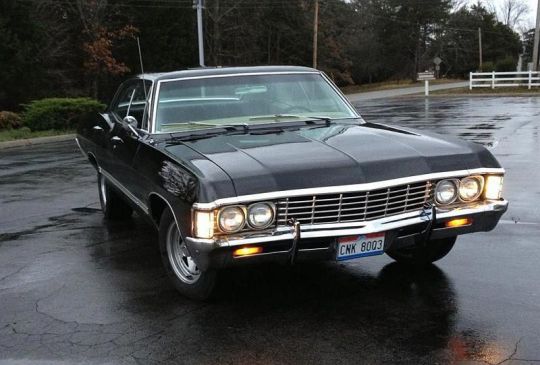
Baby—the only true NB of the first run
All right, time to jump.
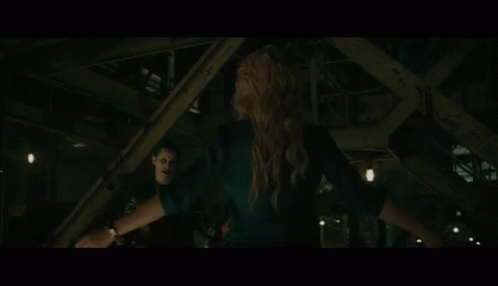
Say hi to our ladies!
Mary Winchester
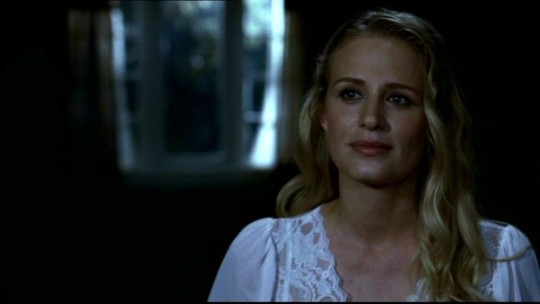
Killed in the very first scene to give the story a reason to exist, she remains an active presence throughout the first arc where she has a wide-reaching influence on the plot and characters, driving the conflict on several levels. Fleshed-out more and more with each appearance to be more than just “the dead mom”, she’s portrayed as protective, pro-active, capable, and assertive, mirroring the duo’s desire for normal life and their inability to have it. Her story comes full-circle in season 5 when the personal tragedy of her fate is embedded in the wider tragedy of the Winchester family curse and the overall theme of destiny.
Status: Dead as of s5
Importance: Major
On her own: Textbook example of fridging… and that tropes aren’t bad in and of themselves.
Jessica Moore
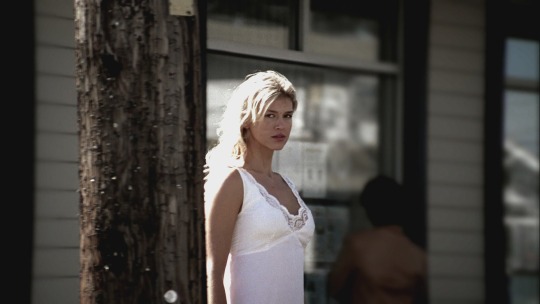
Comparatively, if anyone doubts fridging can evolve into something meaningful, Jess drives the point home by having no personality and no point but to prop up her boyfriend before she ends up pinned to the ceiling, the reveal of which is the most interesting thing about her entire existence. At best she’s a symbol of Sam’s civilian life, at worst an obstacle to be removed for the story to happen.
Status: Dead as of s5
Importance: Major in terms of manpain, non-existent otherwise
On her own: A cardboard cut-out, barely qualifies as a character
Missouri Moseley
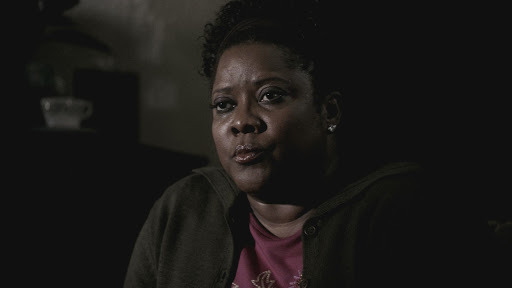
A psychic and the primary reason why John Winchester even knows to wipe his ass. Appears once over the course of the first arc yet everyone wants her to come back years later—that’s how awesome she is. Has this fantastic trait of being compassionate and empathetic while not taking a single speck of shit from anyone, especially when it comes from the two main dumbos who might just as well have been raised in a barn. Is very particular about the pristine state of her coffee table.
Status: Alive as of s5, killed in s13 (wait, what?)
Importance: Major…ly wasted potential
On her own: As strong a character as Bobby Singer, and as worthy of being elevated to the main cast.
Lori Sorensen
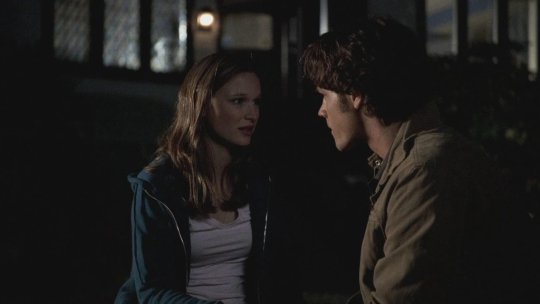
The writers can’t figure out why anyone in the universe would care about Jess either so they insert an intentionally awkward romance subplot to convince people the time’s not yet ripe for Sam to stop grieving and start slaying. The result’s… erm… well, awkward. Lori’s naïve, sheltered, devout though accepting of her non-repressed friend, and sort of on a religious crossroads because of her hypocritical preacher father. I guess the virginal power of her virginal virginity does… something in the plot? Primarily a vehicle for Sam to mark the stages of his moving on.
Status: Alive as of s5
Importance: Minor
On her own: A bit done. Like a bit lot. Like a “could be a trope namer” bit lot.
Meg
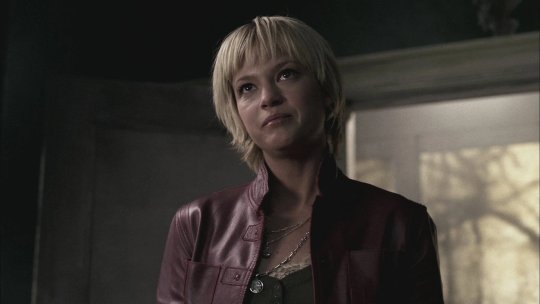
Boom, baby!
Arguably the chief antagonist of season 1 and one of the best things about it. The first one to point out the pervasive toxicity of the Winchester family business, so props for perceptiveness. Possesses the standard qualities of a lower-level henchman—manipulative, no-nonsense, and quietly sinister which, while not exactly groundbreaking, sets her apart from the other bad guys in the season as they tend to have no distinguishing characteristics at all. Plus Nicki Aycox makes the role seem more unique and “lived-in” by projecting a sense of understated amusement at the two main chucklefucks. Is one of S1’s turning points in blurring the lines between monsters and humanity. Has a face transplant twice—once to have revenge (good on her) and the other time to pursue someone else’s goals again before getting stomped into the ground like a mook.
Status: Alive as of s5 (?), killed in s8
Importance: Major
On her own: The actresses do most of the heavy lifting. Which doesn’t mean I don’t love watching the character burst onto the scene and announcing the end of the Winchester brand of bullshit.
Layla Rourke
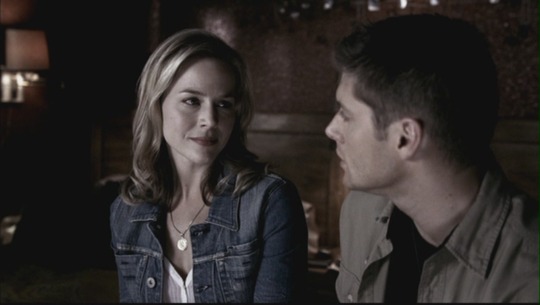
A terminal cancer patient in a religious cult, she’s a more mature take on a Lori-type character and the themes of faith and doubt. Serves as a conduit for Dean’s budding survivor guilt, self-loathing, and sense of worthlessness. Is kind and cheerful, with strong hints that she’s relying on forced optimism to get through the days; also understanding of the circumstances of others while realistically freaked about the possibility of death. Weirdly, she enters the episode already in a state of acceptance and leaves it just as accepting when it’s confirmed that yeah, she’ll die soon. All expressions of anger at the injustice and senselessness are left to her mother which somewhat undermines the “struggling” portion of Layla’s character and renders the final scene where she makes peace with her fate a bit hollow.
Status: Implied dead
Importance: Minor in the overall narrative, major in the episode and Dean’s development
On her own: I want to like her, I really do, just… if only she were allowed to get pissed, once.
Cassie Robinson
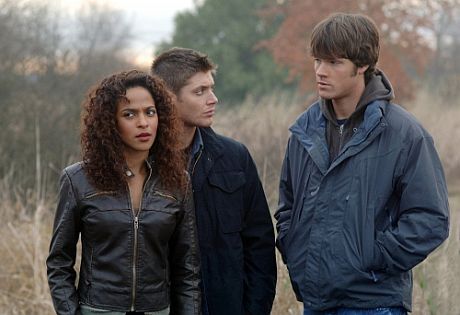
Dean’s ex and that’s pretty much all there is to her. I struggle to pinpoint a single personality trait of hers—the 2000s idea of a “strong woman” and “not like other girls”, perhaps? Undermined as a love interest because TPTB don’t show the happy or any parts of her relationship with Dean so really, why should anyone care if two sniping assholes with little to no chemistry get back together? Memorable for being in a horribly scored softcore scene which YouTube tries to convince me lasts for shy over a minute, not the week I remember it to. Involved in the show’s first and last attempt at incorporating the issue of anti-black racism.
Status: Alive as of s5
Importance: Minor
On her own: She’s in the racist truck episode. ‘Nuff said.
Sarah Blake
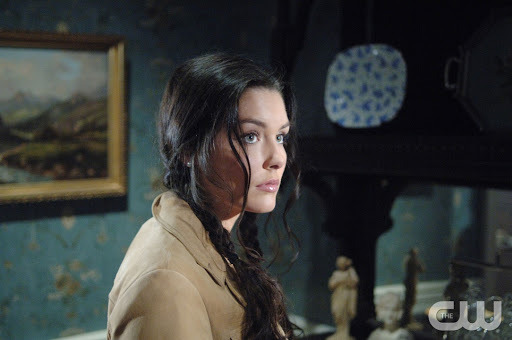
A sophisticated people-person conversationalist with a love of high art and a deep sense of introspection. Ascends to the state of godhood by being able to pull off pigtails while adult. Bonds with Sam over responding to loss by crawling into a shell but deciding to move on. Doesn’t care for your fancy schmancy fine dining, Romeo. Isn’t ashamed to openly talk feelings which includes her explicitly asking Sam if they have a thing going on (honestly, this is such a breath of fresh air for a normcore romance). Despite being scared out of her wits, she refuses to be shoved into the helpless civilian box after learning about the existence of the supernatural; Dean creates a Pinterest wedding board in response.
Status: Alive as of s5, pointlessly dragged back to be murdered in s8
Importance: Minor in the overall narrative, major in the episode and Sam’s development
On her own: A great love interest that has enough writing behind her to fool you into thinking she’s something more.
Up next, whenever I feel like it, seasons 2 and 3!
#spn#spn critical#supernatural#supernatural critical#sexist writing#mary winchester#missouri moseley#meg masters#sarah blake#layla rourke
15 notes
·
View notes
Text
Honest KH2 Critique
I wanna talk about Kingdom Hearts II since we're quickly approaching it's 15th anniversary. Ever since it was released, it's become a game that people irritatingly refuse to be moderate over, or at least when it comes to the vocal fans online. People who love it don't love it so much as worship it, while people who hate it don't hate it so much as despise it with every fiber of their being. I may technically fall into the "love" category (I share the majority fan and critic view that KH2, especially it's Final Mix edition, is the best game in the series), but I'm also willing to look at both its good and its bad, and do so in moderation rather than hyperbolically.
And I know, without a doubt - Kingdom Hearts II...has the absolute worst-written story out of the KH Trinity!
OK, that was said hyperbolically, but I did so as a joke!
It's so weird that the original Kingdom Hearts and Chain of Memories have narratives that are deeply and thoughtfully structured with such care and consistency, and then the trilogy is rounded out by such a messily-written rollercoaster of quality!
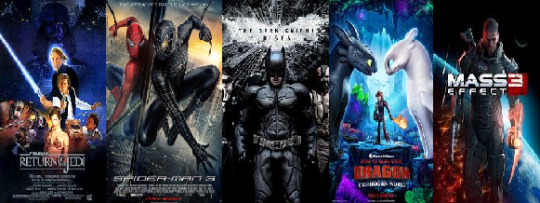
.....Well, all right, maybe not that weird.
When interviewed shortly after KH2's first public reveal at the 2003 Tokyo Game Show, this is how Tetsuya Nomura described the process for writing the game's story: "I'm writing the plot, the main story of Sora and co. Other people are in charge of the plots for the events that will happen in each Disney world. Combining that with Nojima, we're completing one scenario."
The "other people" in question are the Event team: Masaru Oka, Ryo Tsurumaki, Michio Matsuura, Atsuko Ishikura, Yukari Ishida, and Kumiko Takahashi. Daisuke Watanabe and Harunori Sakemi also assisted Nojima with scenario writing whenever the need arose.
The problem that this process caused isn't apparent at first glance, but it's actually right there in that interview excerpt: "I'm writing the plot". In KH and CoM, Nomura only wrote the initial plot outlines, which were very simple and ripe for being fleshed out by the actual scenario writer. There's a big difference between that and writing a full-fledged plot the way he did here.
Nomura wrote the story for what transpires in the KH-original worlds: Twilight Town, Hollow Bastion, the World That Never Was and Destiny Islands. It goes like this:

As far as plots go, I actually really like this one. It's a strong plot.
It's also convoluted as Hell.
I made a post saying the three one-word convoluted elements of KH2's plot are "Nobodies", "Data", and "Ansem". All three of those are literally the cornerstones of this plot that Nomura cooked up: they play a huge role through the beginning, middle and end! Because Nomura had more power with making this game, none of the more...out-there stuff that these concepts created could be curbed or removed. Which means that the scenario writer had better be in tune with Nomura when it comes to presenting them in a coherent way.
For the most part, Kazushige Nojima was....not.
Here is a tell-tale sign that Nomura and Nojima were not in sync. When asked if he planned from the start to make Kingdom Hearts be the heart-shaped moon seen on the cover of the original game, Nomura replied "No, I didn't. I asked Nojima-san to write the scenario and in his scenario it was written that the Kingdom Hearts Xemnas created is 'like a moon that floats in the World that Never Was'. When I read that, I thought ‘’Oh, this can be connected!’’"
Nomura just admitted that Nojima essentially had to make up how to convey Xemnas harnessing and trying to complete Kingdom Hearts, because Nomura's plot did nothing to convey it. It was a "wait, how the fuck is he doing that!?" detail. And you really get the sense all throughout the scenario that Nojima is struggling with trying to convey Nomura's stuff, and he has said as much in interviews: Nomura's plot and concepts confused him.
It also doesn't help that Nojima was the least major scenario writer on the original KH, mainly limited to the co-creation of Ansem with Nomura and writing the entire End of the World section. This is probably why Xemnas and Ansem the Wise are clearly the KH-original characters with the most confidence and complexity behind their writing in KH2's scenario. Nojima writes Sora, Kairi, their Nobodies Roxas and Namine, and Riku far more simplistically and trope-y, and the other Organization members and trio of Hayner, Pence and Olette are side characters so naturally they don't get much depth.
Then there's Masaru Oka and his Event Team. First off, while Masaru Oka is definitely on Nomura's wavelength and understands his vision to a fault, as Event Director he is superbly mediocre at presenting that vision, or Nojima's for that matter. He just isn't cinematically inclined the way Jun Akiyama was in the original KH, and that leads to the event scenes usually being the barest minimum of adequate at best, and laughably awkward at worst.
Secondly, Oka and his team were responsible for creating the plots in the Disney worlds (hence Oka's credit alongside Nomura under "Base Story"). But not only were they frequently lazy and just directly rehashed the movie's story but with Sora, Donald, Goofy and the Heartless shoved in, but half of the time they didn't even bother connecting the world plots to Nomura's main plot in any meaningful way beyond thematically ala CoM, and neither Nomura nor Nojima seemed keen on correcting this even when they really should have.
Here is a chart displaying the game's flow, stage by stage as set by world battle level. Stages where the main plot is progressed in some way are bolded, and stages of the main plot as created by Nomura have red borders around them:

Aside from Space Paranoids which was part of Nomura's plot from the get-go, the only time where correlation with the main plot occurs without any side factor to note is Beast's Castle, where both visits feature the machinations of Organization member Xaldin and culminates in the boss battle against him that leads to his demise.
Olympus Coliseum correlates to the main plot in the first visit but not the second, although the second visit is now made plot-relevant due to tying up loose ends from the first. Port Royal correlates to the main plot in the second visit but not the first, although the first visit is now made plot-relevant due to setting the stage for the second (it also has Larxene's Absent Silhouette in FM). There is technically a main plot correlation in the second visits to the Land of Dragons and Agrabah (the latter of which has Vexen's Absent Silhouette in FM), but Nojima botched the writing of them to the point where there may as well not have been, especially in the case of Agrabah’s which is "oh btw, an Organization XIII member came by off-screen".
And then there's the case of Disney Castle / Timeless River, which only acquires relevance to the main plot because it was decided that Maleficent should be resurrected and be Pete's boss in the present time. And unlike her appearance in Halloween Town, her role in this stage correlates directly to her role in the main story, revealing her resurrection to the heroes and establishing that she seeks a new evil stronghold from which to advance her return to power. Pete's backstory and connection to King Mickey shown here also receives a direct reference toward the climax of the World That Never Was.
While it could be argued that there's additional value in the first visits to Port Royal, Agrabah, Halloween Town and Pride Land due to the presence of Pete (Maleficent when it comes to Halloween Town), I would have to disagree because nothing they actually do in these stages end up mattering to the main story whatsoever - especially in Pride Land, where Pete just shows up in lion form to say “Ooga Booga Booga!”. Their presence alone just ain't enough.
The consequence here is that for the continuous stretch of Port Royal in the first go-round, Olympus Coliseum in the second, and Agrabah, Halloween Town and Pride Land in both go-rounds, it feels like nothing is advancing. And as bad as that sounds on paper, it's even worse when applied to gameplay because it means this lasts for several hours straight! The only main plot event that happens in either cycles is Kairi going to Twilight Town, which happens in a sudden cutscene between Agrabah and Halloween Town and is thus totally out of the player's control!
To sum things up, Nomura wrote a main plot that was good but too overwrought with confusing and complicated details. Nojima is a highly talented writer, but he didn't fully get Nomura's vision. Oka gets Nomura's vision, but he isn't a highly talented Event Director (and as seen in later games, he has even less talent as a writer) and often portrayed scenes that Nomura or Nojima came up with flatly. And none of these men were in sync when it came to how the Disney world plots and the main plot would connect, often simply not caring or else just not trying hard enough.
That is why KH2 has the weakest writing in the KH Trinity: the primary creative voices that shaped the story were completely out of sync with one another on a regular basis. You could say that their hearts just didn't connect on this project. And as a result, we have blatant inconsistences, bad edit jobs, pacing problems, mood whiplashes, missed opportunities, and dumbass moments galore.
However, on the occasions where things between them did manage to sync up, we were given some of the highest points in not only the KH Trinity but the entire KH series, and the input that was given from Daisuke Watanabe, Harunori Sakemi, and others like production assistant (and major Disney fanatic) Eri Morimoto surely helped the messy story become not quite as big a mess as it could have been otherwise. And that story still stayed true to the series' roots as a whimsical Disney/FF crossover project driven by relatable characters and emotional resonance, as opposed to a vanity project for Nomura that is driven by perplexing lore, plot twists and mystery boxes.
And that's why I and so many others love KH2, warts and all, and would gladly take dozens more narrative messes just like it over the different, far less enjoyable kinds of narrative messes that we've been getting afterward.
8 notes
·
View notes
Text
i get why tim isn’t in any dc animated movies
i don’t love it, but i get it. and i say this as a fan of tim drake, he’s my favourite robin and one of my favourite characters. but i get why they’ve more or less omitted him from the animated universe (save for his, like, four lines in young justice). and the short answer is that he makes things complicated.
long answer is that unless you’re making a specifically Tim-centric movie, he really is (narrative-wise) expendable. take “under the red hood” for example. that movie is about jason and bruce, plain and simple; the messy and complicated relationship they have post-jason’s death, and some bonus thematic meditations on the no-kill rule and why it’s so important to bruce.
it would honestly be a detriment to the shakespearean levels of drama that come from a story about a scorned son returned from the dead taking revenge on both the man who killed him and the man who let the murderer live… to take care of this side plot wherein jason has to deal with a new kid who took his place. it’s a good story to explore, especially with a long-form medium like comic books, but trying to pack something substantial from all the disparate pieces into a 90 minute movie is just going to make it messy and take away from the real focus and thematic drive of the story: jason and bruce.
same goes for “son of batman” with damian: tim makes things complicated. it’s hard to make the core of the story about bruce and damian when theres this other kid there, who happens to require some heady exposition to explain his presence in the first place. and the thing is that tim is pretty easily removed without damaging that narrative core, so it’s in the writers best interests to do so. (also tbh damian would be a much less sympathetic character in those movies if his introduction was beating the shit out of tim and alfred. add that to the fact he’d have to be made robin by the end of the movie, and it’d make that achievement bitter-sweet if he’d be shoving tim out of the position. it’s narratively easier, simpler, cleaner, to have him take a vacant position from a long since graduated hero than to snatch it from another kid)
and that same philosophy kind of extends to the batman animated series as well, with the strange blend of tim feat. jason’s backstory. because jason’s backstory is the more concise story to tell - one you could knock out with an elevator pitch:
“young thief with a heart of gold gets taken in by Bruce Wayne/Batman and gains a family/purpose by becoming the new Robin”.
tim on the other hand requires first: an explanation of jason and his death, an explanation of dick and how tim figured out his and bruce’s identity, and if you want to be character-accurate, explain how first tim realizes batman’s gone off the rails, how he goes to dick grayson to convince him to be robin again, and once tim’s exhausted all other options, decides he must become robin himself. and that’s without even mentioning tim’s life outside of batman and robin. his elevator pitch would be something like:
“upper middle class boy who idolizes batman and robin figures out their respective secret identities, and when the second robin dies he sees batman begin to descend into violence. he decides the solution is that batman needs a robin, and tries to convince the first robin, now nightwing, to take on his old mantle. this fails and in a last ditch attempt to save batman from himself, tim dons the robin outfit and proves himself to batman and nightwing. he gains a family (except not entirely because he has a living family but they’re not around much so its ok) and a sense of dire responsibility by becoming the new Robin and filling a dead boy’s pixie boots”
with tim, things get complicated. which isn’t to say there cant be a movie about tim drake, in fact i think it could be great, but his story wouldn’t be anyone’s first pick.
why would you choose a convoluted/ethically ambiguous character study about a teenager who is a) convinced that he, a thirteen year old, should shoulder the emotional baggage of a fully grown man, and who is b) proven right by the end by becoming robin (egad think of the children)
…when you could instead have a cleanly defined dramatic tragedy about an angry son and his grief stricken father, or a clear narrative wherein a son raised without his father must now contend with the way he was raised vs the teachings of a man he greatly respects but has never known. or even a coming of age drama about growing out of the child/parent roles set up for us, and how sometimes we just have to move out and become a police officer/disco vigilante, dad.
tim makes shit complicated. its hard to do a father-son relationship story when tim already has a dad who is ambiguously neglectful but by no means an irredeemably terrible person.
and you could take that as an opportunity to explore the complicated emotions we can feel towards loved ones who mistreat us, and you could interrogate the implications of a thirteen year old managing the emotions of a grown ass man, and you could showcase the fucked up amount of victim-blaming rationalization when it comes to discussing jason, and you could really delve on into the ethical/moral grey areas of pretty much all of tim drakes story. but it would be complicated. and probably not to everyone’s tastes. and not as easily comprehended as clearly defined, emotionally satisfying father-son stories (with 100% less attempted fratricide than the source material)
#tim drake#im sure you could tweak his backstory to be more palatable and concise#but thats the thing#youd have to change a lot in the adaptation#and why make up a new story when you could just graft in someone elses#tim is a good robin and a great character#but his everything is much harder to adapt into 90 minutes of satisfying storytelling#so they cut him out#which was the right decision in my opinion#but i still long for what couldve been yknow#soapbox
1K notes
·
View notes
Text
Finished Nier Automata, and I have many.... many thoughts.
I just want to start by saying that this game is aggressively bleak once you hit Routes C/D. Endings A/B are really the last bright spots in the story, and then it's just tragedy after tragedy from that point forward, and the worst part of it is that none of these tragedies result in anything good or even decent or even narratively satisfying. They just happen, and you're left thinking "wow, that fucking sucks" before you shake it off and proceed with the game.
Despite that, I kept playing because I thought all these tragedies would eventually result in something that would've made the characters' suffering worth it because that's just how a good story works, right? But that never really happens (at least, not within the context of the story itself), so when I finally got to Endings C/D, I honestly felt like I'd spent ~27 hours playing a game just to watch the leads die terrible deaths. It just felt really hollow and pointless.
But then I got Ending E, and that kind of changed my entire way of looking at this game.
So this ending shows the PODs deciding to try salvaging the androids' data rather than deleting it all as ordered. The game warns you that saving the data is risky and unlikely to work, then says "Knowing that, do you still wish for them to survive?" Choosing yes turns the credits scroll into a hacking minigame that is UNFORGIVABLY!!!!! difficult, but each game over screen reels you back in with something like "IS IT ALL POINTLESS?"/"DO YOU WANT TO GIVE UP?"/etc.
Now if you're connected to PSN, you'll also get little encouraging messages from players all over the world on each game over screen, but I wasn't connected for my first playthrough lmfao, so I just suffered through it for like 20 minutes and was starting to think the whole thing was deliberately impossible just to give the player one last kick in the teeth and show that yes, it really was pointless and that they're wasting their time trying to fix something that can't be changed. With the way this game's storyline played out, that really wouldn't have surprised me.
But then I restarted the segment and connected to """The Network""" when prompted, then died a few more times before getting a screen asking me if I'd like help. And I really wish I'd screencapped that prompt because that was when I started noticing all the little messages that other players left. There was one from someone in China that really got to me for some reason, and I can't even remember what it was lol, but it made me tear up. Once you restart after that, a bunch of other players' cursors will join in the fight to help you and the solo singer turns into a chorus, and I just.
😭
Every time you lose a player, though, you're told that "[name]'s data has been lost," which I thought was kind of sad, but it wasn't until I finally beat that segment that I realized what they all had actually done. After the credits wrap up, you learn that all the players who helped you finish the game gave up their save data to do it, and then you're asked if you'd like to do the same to help someone else. And while I've since learned that all this actually does is let you leave an encouraging message for other players and have your username show up during the ending sequence for someone else (sort of like an arcade game's scoreboard), the game presents it as an opportunity to really help other players finish the story, so of course I said yes. It wasn't a hard decision at all, and making that choice after playing through the credits was easily the most rewarding part of the entire game, or really any game I've ever played.
And I know I've spent like... 75% of this post talking about a credits sequence lmfao, but that really did change how I look at this game. When you finish the storyline with Endings C/D, the answer to this game's whole thematic question of "What's the point of living?" seems to be "There ain't one, chief." But finishing with Ending E, the answer leans more toward "The point is hoping for and working toward something better because you believe it's there." Add in the fact that you're given the option to "sacrifice" yourself to help someone else continue, and that the game makes this such a painless decision despite what an actual pain in the ass it is for you as a Gamer™, and it actually makes for a more satisfying ending than the in-story ending.
SE could've just had that one sequel-hook scene play at the end of the credits without the minigame at all, or just gone the typical RPG route and made that scene unlockable if you got 100% or whatever. But instead, they took this really creative meta approach that not only pushes you to do a task that's seemingly impossible, but also asks you to sacrifice something you've worked hard for just to help someone else get through that same task. And the fact that so many other players made that choice is just really sweet and honestly kind of touching. Like I'm sure plenty of people just got around it by saving their data on a usb lmao, but still. It's a nice thought. And for the record, my username is Larkey, and my message was "I bet you're having a tough time right now. But we've got this!"
Anyway! Other things about this game:
2B's history of killing 9S over and over or A2's backstory with Anemone and the YoRHa troops definitely should've been given actual screentime, and not just stated in the last 2 minutes of the story or shoved into some optional text. Watching 9S's grief-turned-madness was fascinating, sure, but 2B and A2 deserved just as much focus on their grief (which would've been way more interesting, just for the record. 2B purposefully distancing herself emotionally from someone she has to repeatedly kill, and A2 feeling betrayed by her own creators after watching her friends die needlessly, are storylines that would likely have a lot more emotional weight than "angry teenage boy goes on murder spree before finally getting his revenge only to fall on his opponent's sword and die like a dumbass."
I know the Nier franchise has approximately 93 trillion pieces of supplemental material that fill in the gaps from the games, so it's possible that some of those cover 2B and A2 more, but come on. These characters are just as important to the story as 9S; They should've gotten actual in-game screentime devoted to contemplating their existences/grief/etc.
I talked about how bleak this game's storyline is, but the real kicker for me was the scene where all the children in Pascal's village commit suicide. That just seemed so needlessly cruel, and the fact that it happens (depending on how you play) maybe an hour after A2's shown to have warmed up a bit towards the machines is just... cheap? It really did feel like emotional string-pulling just for the sake of it, like the kind of silly edgelord shit I wrote when I was 14. It's so over-the-top that I almost couldn't take it seriously.
And if all that wasn't 3edgy5me enough, Pascal then asks you to either wipe his memory or kill him because he can't live with the heartbreak. Fuck's sake.
I think what really annoys me about this whole scene is that... This game introduces us to A2 by having her kill a defenseless baby machine, right? So you'd think there'd be some kind of reflection from her after Pascal loses all the children in his village. She fought an insane battle to protect them, too, and she's clearly horrified when she finds out what happens to them, but... that's kind of it. This incident is never brought up again, despite the huge impact it should have on her character.
The only thing this scene really does for the narrative, I think, is set up a parallel between Pascal and YoRHa troops like 2B and 9S. And in that way, it does fit into game's overall theme of finding meaning for your life, especially after you've lost what you were living for in the first place (so Pascal's community, and YoRHa's "god worth dying for"). But like I said, the game never really seems to resolve that thematic question within the context of the story itself. And even if that parallel was the point, you could've accomplished it by just having everyone in the village die during the cannibal machine attack and Pascal + A2 failing to save them, no baby suicide needed.
I dunno, I've gone back and forth on how I feel about this scene, but honestly, more than anything, it just comes off as a try-hard, eyeroll-worthy way for this game to earn its M-rating. And the fact that A2 gets 0 character development out of it just makes it seem lazy.
Characterwise, I'd definitely say A2 is my favorite. Her ending on the C/D routes was probably the most satisfying just because she essentially gets the only thing she's really wanted ever since she lost her friends, and I thought her unusual relationship with 2B was interesting (and again, deserved more screentime).
2B's also great, especially on the second playthrough when you know why she purposefully tries to get 9S to shut up anytime he innocently wonders something out loud. And I like 9S too just because he's so endearing in Routes A/B, making his stark personality shift in C/D that much more jarring. I'm a little annoyed that he never finds out why A2 killed 2B, though by the end of C/D, he's probably too far gone to actually take that in.
I liked most of the NPCs, too. Anemone and Jackass are my favs, but 6O and 21O have some good moments, too. And while a lot of the female YoRHa designs are just... embarrassingly male, there are some really creative character/boss designs here and there. Simone's corpse dress is probably something I'll never forget.
The soundtrack is incredible. "Weight of the World/End of YoRHa" is a standout track not just because of the ending it plays through, but also just because of how cleanly it blends together the 8-bit sound from the hacking minigames and the English and Japanese versions of the song, and how it ends with the game's fictional "Chaos" language (which is apparently meant to be a futuristic blend of English, Japanese, Gaelic, and a few others). I definitely want to check out more of Keiichi Okabe's work, and that of the singers for all three languages.
Some other favs are "Vague Hope," "Wretched Weaponry," "Alien Manifestation," and "The Tower."
I enjoyed most of the gameplay. The hacking minigames could be a little tedious sometimes, but overall, I found myself enjoying 9S's gameplay more than the other leads' because of it.
I also actually liked most of the sidequests, too, and I normally don't like those all that much in other games (well, okay, I mainly just hate them in FF7R). I think I liked the machine quests the most because so many of them were just silly and low stakes, which was a nice change of pace compared to the main story. I remember the Father Servo one making me laugh a few times. And as for the androids, I liked 11B's memento quest and the Amnesia one (partly because 2B and 9S bicker so much through it, and partly because it's the first we hear about execution models).
I loved the voicework in this game, especially A2 and Anemone's. And whoever voiced 9S did his job perfectly.
I was crying through that whole Ending E sequence, but the part where the POD asks you something like "You put all that work into unlocking Chapter Select. Are you SURE you want to delete all your save data?" made me crack up. I'm doing a replay now, and Chapter Select is probably what I miss most from my original save data lmfao.
So... yeah? Overall, I liked it. I really do think that credits sequence was what sold me on this game as a whole, as weird as that sounds. I'd say the game's biggest faults are the unbalanced focus on the leads and its tendency to throw in pointless angst here and there, and I really wish those two things could've been smoothed out to make a good story even better, but eh. I'm enjoying my replay now, and I'm taking my time doing more quests and exploring areas. I'm going to try to get more of the joke endings, too.
3 notes
·
View notes
Text
Meat vs. Candy: Meat
Here’s the thing.
I’m hearing two main arguments online... a lot of people saying the epilogues are Terrible, for various reasons, and a few people saying they're Good, with a smaller but vocal subset of those people arguing that if you don’t like them then you’re obviously just expecting to be spoon-fed a fluff ending in which the Character You Like gets a wish-fulfillment storybook epilogue.
There are probably some people who are mad about not getting that. However, I think misrepresenting the range of anger various parts of the fandom are experiencing as being purely some kind of childish knee-jerk tantrum at not getting the toy they wanted is disingenuous, at best, and parallels some of the mistakes of the epilogues themselves. Note that this in no way excuses or justifies people sending the writers or anyone else death-threats or whatever the hell else has been going on.
Honestly... the Meat ending was pretty good writing, in my opinion. It wasn’t comfortable or happy or flattering in any way to a number of characters who I recognize people care deeply about, but it was nothing really worse than I expected from Earth C, based on the fundamental narrative of Lord English’s giant closed-loop system. The loop had to close, in order for Homestuck proper to occur at all. That means that Earth C is where Calliope and Caliborn hatch and grow up, far, far in the future. And that means that universe, like the others, will be destroyed by a SBURB session one day. Sorry, folks. It was never meant to be a 'happy ending'.
Meat was deeply metatextual. It was gristly and greasy and discomfiting. It raised questions about what it means to have a narrator, and whose biases are implicitly included--and I think those are very interesting questions to raise, whether or not they are particularly satisfying to someone who is also reading for the characters.
Spoilers beyond the read-more, for obvious reasons.
That said, there were elements that did surprise me. The removal of the other kids from different points in different doomed timelines, to fight with John against LE, rather than being his teammates from Earth C--but from John’s perspective, it doesn’t seem like there’s much difference. Either way, they’re not fully ‘real’ to him (and barely feel real to us, as quickly as they appear and then die). He’s from the Game Over timeline, he’s battling depression, and nobody in the retcon timeline is really quite authentic to him, either--just as to many fans, they didn’t feel quite authentic, when the retcon happened and we had to suddenly let go of the characters we'd watched grow and change, replaced by funhouse mirror reflections and could-have-beens.
I’ve also seen some reasonably interesting arguments that a lot of Dirk’s narration, in the Meat route, either sounds eerily like Vriska talking or flips back and forth between Vriska-mode and Dirk-mode, well before alt!Calliope ever gets involved. I’m prepared to believe some Serket element (whether that is potentially Vriska, or the Aranea who was abruptly displaced from her attempt at wresting control of the narrative by John) was involved there, and Dirk was not acting entirely of his own accord. I’m also prepared to shrug and say “okay, maybe it was just a narrative parallel--Homestuck does that a lot”. Some narration, especially when Terezi is involved, doesn't sound at all how I would expect a Serket-influenced narrator to sound with regards to her, in particular. It doesn’t particularly grind my gears to think some version of Dirk, in the right environment, might make a series of choices that leads him to behaving like this, entirely on his own. I recognize that it’s upsetting to DirkJake fans in particular to see their favorite pairing written like this, but it doesn’t feel wholly out of character to me for either of them to develop in these directions, given the right (or wrong) pressures and external situations. This Dirk is the culmination of a very wide multiplicity of Dirks, including at least one if not more who ended up directly subsumed in Lord English and/or under his explicit influence.
I’ve heard that some people were attacking the Meat route on the grounds of transphobia, which... I think is a rather weak argument, given that it’s recognized in the text itself, as pronoun changes are handled respectfully by one narrator-character and inconsistently by a second, who is being set up as the villain of the story. That seems like a pretty solid metatextual rejection of the action, no? Like, if a villain does a bad thing, in a story, while the hero is fighting them, do you argue that the story itself advocates for that thing? There has to be some kind of distinction between ‘character does X’ and ‘author of story advocates X is Morally Correct’, or we would never have any villains at all. Dirk's dismissiveness toward Roxy's agency grows, the further toward 'villain' he slides.
Were there some things I liked, in Meat? I guess. From a sociopolitical and cultural standpoint, the shitty repercussions of the way the retcon gang set up a planet, dumped a bunch of chess people and clone grubs, then left them to do all the work of creating its society and waiting for their eventual 'godly' return... were pretty logical. I'm actually happy that it was acknowledged, instead of just brushed off as inconsequential. It was interesting, too, to see some of the kids playing with notions of gender identity as they grew, and how their companions adjusted. It was telling (in terms of Dirk's character development) how he thought of Roxy and Calliope's gender explorations as something he could choose to 'allow' or not. Also, with how truncated most of the gang's personal development (and plot development) was in Homestuck proper ('thanks', retcon!Vriska), I think it kinda made sense how stunted and incapable of like... dealing with regular life in a functional way a lot of them seemed. Jumping straight to teenage 'godhood' didn't make them experienced or smart. It's sad that all of them just kind of... stagnate there, but Earth C has always felt incredibly stagnant to me.
Retcon!Vriska getting swallowed by the black hole was at least thematically fitting, though I'm wondering why she is using such Seer-themed language, suddenly. I also like that the wallet is finally back in play. Rose and Dirk's philosophical debate about individuation and free will is delightfully creepy, given the themes of the story. There are moments, within the story, that the turns of phrase and the humor just hit me full in the teeth and remind me this is Homestuck, and I do love those moments. And of course, my xenobiological worldbuilding interests enjoyed that apparently, earth onions are quite toxic to trolls.
Were there things I didn’t like in Meat? Yeah, of course. I don't particularly like that John, an Heir of Breath--one who is innately positioned to awaken Breath, freedom and motivation in the people around him--callously shoves an unresisting teenager he's barely met into a refrigerator and just leaves him there, apparently convinced he deserves it.
Did some of the things I disliked relate to the storytelling itself, rather than just how characters were characterized, or what actions they took? Yeah. Why are we still out here queer-baiting with Dave and Karkat? Years have passed. They have spent literal years sitting 1.5 feet apart so it's 'not gay'? I sincerely don't think this pairing is actually healthy or beneficial to either of them, the way it developed in canon, but come on. Then, they still balk and drag their feet unless it's being narratively pushed on them by someone else. It's just painful to watch.
I also take a certain level of personal offense as a Tavros fan when the narrative goes out of its way to repeatedly harp on Tavros being useless and no one giving a shit what he's doing. Ghost Tavros was awesome, okay, and was personally responsible for gathering the ghost army, so fuck you, Vriska-coded narrator. You have bad judgment. But that is not a crime of writing, if it is an intentionally biased perspective and not just writers taking cheap shots at a character they don't happen to like. I'm just incredibly tired of it being done habitually and collectively, as a fandom, to that character in particular. Furthermore, I'm really discomfited by the way Tavros's development (am I the only one who remembers him dancing and telling Vriska to suck it?) is completely ignored and de-legitimized by having him immediately fawning on her, trailing around after her, hiding against her shoulder, etc. Tavros was a victim of emotional and physical abuse, at Vriska's hands. Can we just agree to stop narratively forcing victims back into contact with their abusers, period? It's not a good look.
Moreover, there's the whole misogyny angle. When does a story about misogynistic characters (and narrators) doing misogynistic things while misogynistic shit narratively happens start being a critique of misogynistic tropes rather than a tired old rehash? Every step Jane (allegedly a strong, independent woman, though also stepping into her dictatorial role as 'Heiress') takes is either dictated by Dirk, sent into a complete tailspin that upends her confidence by Jake, or verbally decried as factually wrong and/or stupid by Dave and/or Karkat. Rose and Kanaya both have their agency overwritten and end up separated from each other through the actions of Dirk, and Rose becomes an extension of Dirk, losing her very selfhood. Jade is treated as an accessory to the DaveKat trainwreck, simultaneously discounted as actually emotionally relevant and blamed for its ludicrous problems. She, of course, also ends up having her agency overwritten as she's plunged into a coma and possessed, prevented from actually having reactions to the things that are going on, or taking action for herself. Borrowed!Rose and Jade are KO'd almost instantly in the fight against Lord English, and become either literally erased, or dead weight for a male character to drag around until it's no longer convenient. Terezi admits to wasting a huge amount of time trailing around after Vriska--who was an emotionally abusive gaslighter to her, on the retcon!meteor. (And we're back to victims being constantly evaluated according to their proximity to their abusers again.) Then, she's on to redirecting herself into some quest on John's behalf, instead. She's still not living for herself. Finally, you show me an Aradia who would ever, ever be concerned about 'saying more embarrassing stuff' around Dave, or thinking of him as an ‘outrageously cool dude’, and I'll show you a bridge I'd like to sell you. That ain't any Aradia I've ever seen. So who’s narrating there, Dirk again? A third party?
Other weird things: apparently Jane's kidnapping in the snapchats just... never gets explained or referenced again? I went back to reread those, and they connected to Meat even more than I realized at first. I guess Jane grew up to be... exactly what she was raised/groomed to be, which is *uncomfortable* but not particularly shocking. I feel bad for people who were hoping for happier endings for the human kids, but I don't think I ever really expected Homestuck to serve up happy endings. I don't buy that things in the snapchat were just thrown in at random, though. Those elements were there for a reason, and arguing that everything in the snapchats were connected to the epilogues EXCEPT that one major extended plotline doesn't make sense. Especially when it visually and narratively seems to be a direct link to the events of the Meat storyline.
Also, where the fuck are the sprites? We never see or hear from Jasprosesprite, Gcatavrosprite, or the Nannasprite(s?) again. I’m not sure anyone cares, but. Uh. Yeah.
I have other thoughts regarding the classpect-coded language that crops up pretty frequently in the epilogues, but I think I will devote a separate post to that, if I get around to it, given that this *is* at heart a classpecting blog.
So anyway, Meat ends, it's depressing and futile and grim, I get it. I don't like every element, but it hangs together as a story with a narrative, overall.
Then we get to Candy.
Hoo boy.
I’ll tackle that one next, but as it was considerably more upsetting for me to read, rereading it for fact-checks and commentary is going to be a lot harder for me. I’ll get through it here sooner or later, though.
25 notes
·
View notes
Text
I keep thinking of Steve’s ending in Endgame and honestly as a writer and a viewer I’m baffled as to why the fuck whole teams of people thought having him end up with Peggy was a good choice.
As a viewer the whole reason I invest in stories is change- when the movie ends something should have changed about the characters, the setting, or the audience depending on the thematic payoff/ plot/ characters. Steve changed plenty over the years and it already pissed me off that the narratives of his stories never let him leave the Golden Boy Always Right Lawful Good box he started in and quickly grew out of. Already, the narrative never let Steve fully realize his character development and that’s really irking because, as a viewer, that makes his arcs lacking for a real payoff when he’s never allowed to be wrong, fail, and get back up even when he does do wrong, fail, and get back up. Its just portrayed as him being right the whole time and that makes no sense. So as a viewer I already didn’t like what canon did with an otherwise wonderfully textured character- seriously, if not for the narrative always shoving him back into his Good Boy box he’d probably be one of my favorite characters, but instead his development was always undercut with it. That made it hard for me to invest in a character that was changing, but never allowed to change fully because the narrative wouldn’t allow it.
As a writer the goal of a story is to change something. Change is what drives a story and if nothing changes you end up cheating the reader/viewer because if nothing changes then why the fuck did they invest time to watch it all end the way it started? What’s the point? There’s exceptions to every rule- 500 Days of Summer ended the way it started but that was the theme. That was a movie meant to alter audience opinion of Tom’s character and it was a major part of why the story was told that way. With Steve’s ending I can’t see why he’d even do that, go back in time and leave everything behind. I know he’s done some dumb shit but I can’t bring myself to believe that he’d abandon Bucky, who drives his actions for the rest of the series after FA, I can’t believe he’d let Peggy become complicit in Nazis invading SHIELD, I can’t believe he’d let Howard die let alone Bucky’s implications in all that, and that’s before the 2000′s hit.
As a writer I see no thematic payoff in that especially because, as much as I love Peggy Carter, they dated for less than a high school semester. I can’t even see why she was that important to Steve especially when Bucky was his driving force after all that (and to a point in FA too). As a viewer I’m pissed that they went back on what little development they allowed Steve and as a writer I can't believe someone would sit down with several teams of people and say ‘yeah, so if we don’t actually change anything about this character at all, go back on his development, and give him an ending that cheats his love interest out of her original happy ending, husband, and kids that’ll be fine, yeah? No one will feel like that’s heinously selfish, makes no sense in the context of his story, has no thematic payoff, and they probably won’t feel cheated out of a real ending for him where he, you know, changes, right?’
Steve has always been a man out of his time, always felt a little uncomfortable as Captain America, and always ended up just short of ever genuinely feeling like he’s doing good. His arc should have been to put the mantle down- give it to Sam like he did in canon because Sam is genuinely the perfect Cap replacement, no one else could properly fill Steve’s shoes and potentially do better (because Sam’s lacking all those mental health issues Steve has, and the problems he does have he’s much more aware of than Steve). After that he should have retired to figure out who Steve Rogers is outside of Cap. His ending should have been to shed Captain America, an ill fitting identity, to be the Steve Rogers he left behind, whoever he is now. You know, to move on, not to go steal Peggy’s happy ending from her and ignore every shitty thing that’s about to happen. How cruel to Peggy to steal her life away from her like that, and how unbelievable out of character for Steve.
And, from a writing standpoint, absolutely senseless because it cheats the audience- we all invested 10 years into a character, we watched him learn things and change however much the narrative tried to prevent that, and then he got stuck right where he started for what I believe to be no reason. Not when I don’t think that’s where his story really would have ended, especially not with his ‘move on’ speech earlier in the movie. That’s what the writers should have gone with for his story theme, and that life Tony told him to get? That’s what he should have given Sam the shield to do- go out and be Steve Rogers again, to live out his life figuring out who he is, how he relates to the world, and how to live in it without the weight of Captain America on his back the whole time. Also, being a man out of his time wouldn’t go away by sending him back to the fucking past he’s still going to be out of his time that’s not where he lives anymore damnit!!
Anyway, I have a lot of feelings on this mostly because I think Steve’s entire arc, one I feel was already cheated way too much, got totally ruined, sacrificing the real theme of his story to steal a happy ending from a woman he knew for no more than the honeymoon period of a relationship. It out of character for one, and for two, its kind of cruel to literally everyone in his life. I love the idea of Steve getting a happy ending, but I really don’t love that his happy ending comes at the cost of stealing his own identity and fucking everyone he supposedly cares about over, including Peggy! Give Steve Rogers a selfish ending sure, but that selfish ending should have been to give up Cap to do his own thing- something the general public in the MCU would absolutely see as a betrayal, not to genuinely screw everyone over except Sam, kind of.
#winters ramblings#in all honesty though steve would have been SO much more interesting#if they let his WS characterization genuinely spiral out and allowed him to hit a rock bottom#then he could do the CHANGE thing and get his shit together and realize he's no longer a man out of time- not really#hes been around long enough to learn to adjust in the ways he needs#most of his maladjustments are now more mental than being genuinely thrown into culture shock#so allowing him to spin out and then pick himself back up would have been GREAT!#a fantastic take on a character with pretty clear depression and bad coping mechanisms for his loss#and it would have been a fuckton more interesting then canon just deciding hes right no matter what he does#if you wanted steve to be he Always Correct Moral Compass maybe you should have written Superman instead#or at least have done the fucking work to make Steve correct by GIVING him reasonsbe that aren't 'hes cap'#i genuinely like a selfish end for his character because its so fitting#after sacrificing everything its nice that he forces everyone ELSE to give something up#but to steal peggys happy ending and kids? that's pretty shit#not to mention abandoning everyone he cares about#like shit there's selfish decisions and there's needlessly cruel ignorance and the writers WAY crossed the line there#Steve should have given up Cap to Sam and moved on to figure out who he is free ofCap#not fucking steal Peggy's life from her because he's fond of the 4 months they dated omg!
9 notes
·
View notes
Text
Kingdom Hearts 3 impressions
So, uh, I will ONLY be talking about stuff up until the very start of the second World, and only AFTER the break.
Kingdom Hearts 1 was an incredibly important and influential piece of media when I was growing up. I was writing fic based on Smash Bros. just before KH rolled onto the scene was like, “Yo, Disney and Final Fantasy, BAM, fuckin’ random? fucking RADDDD” and I was all about it. You had FF characters remixed with OCs remixed with Disney characters, and the villains were all crossing over to form the League of Bad Cartoons, it was a great time.
And then Nomura realized his gamble was a win and decided to waste the next 15 years of everyone’s time shoving in every trope he liked, every IDEA that felt “cool” together into a mish mash of whatever the hell this “narrative” has become.
Suffice it to say, I’ve got beef with Kingdom Hearts as a “story.”
It just occurred to me today that a big part of this is thematic/tonal.
But it’s also VERY rare, maybe even unprecedented, for a piece of media like Kingdom Hearts 3 to come around.
For years, then months, then weeks, then days, I told myself, “It’s not real, that game doesn’t exist, I won’t believe it until I’m literally playing it” and just could not be bothered to be hype or interested, if only because Nomura’s “vision”, from my perspective, warped something I admired in my youth into a fucking train wreck, leaving me very little to feel emotionally invested in outside of Aqua and by proxy the two lads she is trying to protect. (also I GUESS I’m slightly invested in Axel/Xion/Roxas.../Namine? for similar reasons now that I think about it?)
Well, guess what?
Kingdom Hearts VERY WELL might be real, and I very well might be about three hours into it. And for all of the beef I have with the plot, I am fucking relieved that those three hours have felt/sounded good, as a video game.
NOW we’re gonna talk about the first World.
--
When I first heard that Olympus was gonna be the first World in KH3 I was disappointed and BAFFLED. We’re visiting that place a THIRD time? And why THAT World? Turns out, there’s actually some substantial thematic relevance and that’s actually A-OK, not to mention that starting with a familiar world after ALL OF THIS TIME is not such a bad way to kick things off.
First off, structurally, I actually really enjoyed the way this world played out. Two of my biggest problems with KH as a video game series have been that worlds feel like empty, vacant, haunted houses, and that said worlds are usually small and linear with a lot of pointless backtracking.
Olympus fixes all of this.
There are NPCs. Actual fucking PEOPLE in this world. Sure, they’re just people in danger, calling for help, but they’re THERE for once! And they have vocies! EVERY line of dialogue (except for like one “plot” moment) has actually been voiced so far! About time.
Also. This World is not as linear as most KH Worlds. In fact, it help more open and dynamic than ANY World in any KH game so far, not to mention it featured three, THREE (wtf) unique and distinct types of settings. The city, the mountain, and Olympus. Nice.
ALSO also. The music. We’ve been here before. We KNOW that Olympus theme from earlier games. And as you traverse the city, up the mountain, you hear this more sweeping, movie-like version, and it’s like “oh whoa nice” aaaaand then you get TO Olympus and it KICKS in, the old song, up to modern snuff. That was great. That was a thing that really helped convey “Kingdom Hearts is back, baby.”
The World was big, compared to typical KH worlds. It had multiple nooks and crannies to explore, side-paths to go down, treasure to find hidden away. There is a LOT of verticality. Running up walls and seamlessly hopping over things in the environment makes traversal more enjoyable than it ever has been. Even though a lot of the World is technically a linear path it’s not structured like a path. Going off and exploring rewards you with items and the like, and the World is big enough to actually feel like you have places to poke around in.
Having said this, WHY is there no...map? Like. You literally COLLECT Maps from Chests like you used to. But near as I can tell, there’s no way to pull up an actual MAP, to seer where the main path is, to see where the side paths are. It’s boggling. Maybe the game has the option hidden away somewhere but if so, that’s just silly. And if there’s just no actual map option at ALL that’s just...baffling.
There were barely any load times for how much SPACE there was to navigate, and things looked very shiny and pretty, and ran at a smooth 60 fps MOST of the time. Tech specs aren’t everything, but when your brand is built on “looking pretty” it sure af helps when you bring scale AND a smooth framerate to match.
It’s weird, and a bit jarring, sometimes in a good way, to see all of this stuff rendered in modern tech. Stuff looks...a little too plasticy a lot of the time, (which actually ought to pay off when we get to Toy Story?) but the environments so far feel rich and vast and detailed all at once in a way we just have never seen the series, because we’re basically jumping from PS2-level tech to PS4. So that difference in production is more noticeable for the wait -- I just wish things looked a bit more...I guess cel-shaded? Like the original trailer. Things (specifically, characters) look a little too flat/plasticy at times, for how pretty things are.
Combat seems to be as flashy as ever and I’m sure I’ll feel differently as I get further in and unlock more options but it’s still too easy, simple, and mashy for my tastes. I am HOPING we get more moments that require quick reflexes and specific tactics like the harder moments of older KH games.
The amusement rides mechanic is...weird. It’s given NO context in universe. And they last a little too long/feel too overpowered for how easy they are to utilize. Similarly, there are frequently seemingly random party-member tag-team attacks that...just seem like “press triangle to win” moves. I wish they entailed more interaction, and/or felt less common/random. I like the IDEA of these kinds of moves, especially ones that change your controls/method of attack for a few seconds (like Hercules’ team attack) but the execution makes them feel too cheap and easy to abuse, with combat that’s ALREADY skewing on the “too easy” side for the genre.
I like the “form change” for keyblades, and that you can swap keyblades in the middle of a fight. Really hoping this allows for some good tactical stuff later -- buuuuut that would also require the game to ASK OF ME to do more than “mash X,” which KH as a brand typically does not do...
Characters SPEAK in reaction to gameplay moments, when you initiate things in the environment, etc. It’s a nice touch that makes them feel more like characters in an RPG.
Donald and Goofy are ALWAYS in the party, alongside the Disney member(s). NICE.
Maybe KH3 is putting its best foot forward, but overall, I was pleasantly surprised with Olympus. It single-handedly corrected MOST of the issues I’ve ever had with Kingdom Hearts level design. I only hope the momentum keeps going.
Moving on, Gummi Ships. What little I played is easily the best they have every been. I love having an open world with optional places/fights to explore, while still giving me those shmup-like bursts of action.
The Gummi Phone seems like a fun mechanic, and taking selfies/photos makes SENSE for this game because of how visually detailed it is -- but the pleasant surprise was how I took selfies with Donald and Goofy and they REACTED to it, starting to pose and commenting on it.
On the other hand, the loading screen being nonsensical “social media” posts from KH characters...I don’t like it thanks go away. x’D
I’ve spent only a few minutes in Twilight Town and INSTANTLY I am so much more enamored than I ever was in previous games. Not just due to the bump up in visual fidelity, but also because -- GASP -- NPCs??? Are you trying to tell me this is an actual TOWN that people LIVE IN?? Holy shit, Kingdom Hearts, I never knew!
For all of this stuff I liked, though, KH3 is still...a KH game.
Which means after you get through the intro, after you gear up to land in Olympus, the game flashes the title:
“Kingdom Hearts II.9″
...no.
Just no. Fuck. Stop doing this shit.
Whenever an Organization 13 member (or EX member) shows up and starts speaking all cocky in riddles like the flamboyant anime jackass they are,
whenever Mickey starts dead-ass blathering about weird nonsense
whenever the plot HAS to acknowledge “oh right Sora golly gawrsh ya FURRGOT this random bullshit a-FYUCK better shove this expository throwaway dialogue right in here before we go n’ furrget again!”
whenever Kairi continues to be irrelevant and invisible after ALL THIS TIME
whenever Rikku has to say some obligatory thing about his darkness or his copy of himself or Ansem or whatever
whenever the plot informs Sorta/Dornold/Goffy about another convoluted ridiculous THING that we already know about and they MAYBE already know about because it is OBLIGATED to because this game’s entire purpose has become to “wrap things up already Nomura”
I am reminded of the freshly opened scar on my heart from how much SHIT this series has dragged itself through for...what? Nothing worth all of this, IMO.
Thankfully, these moments feel less and less pressing in KH3′s opening hours than they certainly could be, though I’m sure the closing hours of the game -- once they’ve tidily gotten all of that silly, inconsequential DISNEY CONTENT out of the way (even though that’s the BULK of the game environments and HALF of the series’ identity/purpose) -- those closing hours will surely be packed to the gills with all of this crazy crap.
Maybe by then I might finally care enough to finally get the catharsis I’ve waited over a decade for. I dunno.
I’m just relieved the game looks, plays, sounds, and feels as good as it does so far.
EDIT: almost forgot to mention this since it hasn’t actually come up yet BUT I picked up a BUNCH of “ingredients”??? Like. FOR COOKING??? Which is one of my all-time favorite mechanics in a video game?? (thanks Paper Mario) So I’m at LEAST excited to see what THAT is all about.
1 note
·
View note
Note
Any tips for putting together a Monster Of The Week game? I'm making a campaign and haven't ever played before 😅
Oh, sure! Some of this might be kind of basic stuff that you might’ve covered already but since I don’t know where you’re at in the process yet I’ll try to give some general starting stuff advice. (From your phrasing I’m gonna assume you’re the GM for this.) (Also, uh, some of this got kind of long-winded, but mostly it’s stuff I feel is really important)
Initial thing to consider: Have you played a Powered By The Apocalypse game like MotW before? If not, it’s important to get into the right headspace for it, especially if you’re coming into it off of playing another game, like D&D. D&D and MotW have pretty different design philosophies. Getting into things like “You as the GM don’t plan scenes, you plan a situation” and “You literally never roll, only the players do, you just make your moves” – or hell, the entire concept of GM moves – can be difficult to grasp if you’re like most roleplayers and are coming off a background primarily of D&D, where the GM plans dungeon setpieces and is encouraged to make a ton of rolls and doesn’t really have a system of responding to players’ roll failures in the way GM moves function. I don’t really have any particular advice for this, it’s just kind of a mental unlearning-relearning process anyone has to go through when they pick up a new game. But again, I don’t know your gaming background – you might’ve already cleared this step, it’s just something to keep in mind!
So, I think an important early step in ANY game is having an in-depth conversation with your group about what you want to get out of the game. In fact, I would say the most important early thing in MotW, moreso than the players picking their playbooks, is to have a group discussion of what style of game you want. MotW supports several styles of play that can give you very different-feeling games. You can use MotW to play Supernatural, Buffy, The X-Files, Scooby-Doo, The Dresden Files, or something in between two or more of those – and it’s not gonna be fun if you start playing what you want to be Supernatural and the players want to be Buffy. Talk to your players about tone first and foremost – do you, as a group, prefer something very silly (Scooby-Doo), something grim and brutal (Supernatural), or something in the middle (Buffy)? The MOST IMPORTANT part of this is talking to your players about boundaries. MotW is an action-horror game, and horror comes in many forms that can be touchy for some folks. Talk about what might or might not be comfortable for everyone at the table when it comes to serious subjects that might come up in the game.
Another aspect of that early discussion, less important than boundary-setting but definitely important for the type of story you want to build together, is what kind of setting and style you want for the game. I think it can be useful to establish early on what ties the player characters together. It could just be a location, maybe all the characters just happen to live together in the same weird monster-heavy town and happen to work together, but it can be stabilizing to have something more concrete. The book goes over some of these ideas (I believe it mentions the idea of belonging to the same organization investigating monsters or all the player characters being family members). An important aspect of this is also deciding whether you want the game to be mobile, with the PC hunters traveling from location to location to deal with monsters (this is, funnily enough, both Scooby-Doo and Supernatural style), or centralized in one location with repeated monster attacks (this is more Buffy style). I technically only have direct experience with the latter, but I think both require roughly the same investment on your part, just in different ways (you don’t have to map out every town you go to every session in a mobile game, but you may want to sketch out a map of town in an immobile game, or just use an existing real town and see if you can find a map online – rule 1 of GMing is knowing when and what to steal!).
I think this initial conversation may be more important than playbook-picks, but it shouldn’t be a huge deal if your players already have an idea of what they want to play, as long as you make sure to get on the same page re: tone and style. Additionally, I assume you’re using the updated ruleset from the revised edition of the game, but I’d advise you to check out the old MotW site and its free downloads of other classes that didn’t get added to the revised edition: Here. You’re not obligated to allow any playbooks in particular in the game, of course, but I’d at least say check ‘em out and if you think they work for you, let your players see them too. (You might be discouraged from some of them by tone, and that’s totally fair, some of them are definitely built for sillier games, but keep in mind that can be changed by the right player. My group has both a Luchador and a Meddling Kid that are really human, multidimensional characters, so if that’s what you want and it’s what your players want to do with them, that can work. Of course, if you want cartoon characters, they’re also very good classes for playing cartoon characters.)
As for, y’know, playing the actual game, I would advise you to avoid my mistakes and try to really follow the book’s advice when it comes to early mysteries. Try to make fairly simple, straightforward hunts at first before you start getting complex or esoteric. If you’re like me you might get excited to try to mess with the formula before you even establish a formula for your players, and in a game you’re new to, that can be overly ambitious. (Although you can, of course, get really creative within the formula. Just look at the two example mysteries in the book – in their STRUCTURE they’re very standard, one big monster with a handful of minions that the players have to find a kill, but with radically different styles.)
Remember you aren’t making scenes for your players to run through, you’re making a situation with many dangers (not just the monsters – remember locations and NPCs are dangers, too!) and a ticking clock that the players have to figure out their own clever ways to overcome. It’s their job to be proactive and your job to put things in their way, but let them shove the things out of their way if they figure out how. (Also keep in mind the players can always prevent things on the countdown clock! This is a minor point that I think the game states directly, but don’t start your countdown clocks at something the players have no chance of stopping and/or already happened.)
Don’t worry too much right now about setting up arcs – your players, through their choices in character creation, are likely to give you a ton of fodder for that stuff. IIRC the book advises to start thinking about arcs after you’ve already had the first session, and that’s good advice, but you can probably wait even later than that if you can’t think of anything yet.
Some advice on magic: Let cool stuff happen, but keep in mind the tone and style you set up with your players before allowing something. Magic is flexible in the game, but don’t let clever magic-using players walk all over you. Like I do. A lot. But uh yeah, keep in mind you get to pick the restrictions on a spell. This is one case where GM fiat kinda has to come in to regulate things slightly and you have to decide what makes sense narratively as a cost for the action being attempted. Some characters, like the Monstrous or the Spooky, will logically in the fiction be (super?)naturally magical, so they can get away with fewer of the material-component-type stuff for Use Magic rolls that seem like they should be part of the characters’ natural abilities, especially if you’re going for more of a high-magic game where magic is a little less limited, but you can still put restrictions on things like time in those cases.
Lastly, I don’t want to overwhelm you with options, but I’d advise you to give this PDF a look-see if you haven’t already. It’s about introducing other forms of the supernatural into MotW in addition to the basic magic stuff that the game assumes by default. It adds new “monster” types that are built to emulate threats posed from weird happenings or alien phenomena, to give more of an X-Files or Warehouse 13 feeling where instead of hunting a physical monster, the players are unravelling a strange circumstance and trying to prevent the phenomenon from hurting more people. It also adds options for characters replacing the Use Magic basic move with some other different Weird-based move, which might be near-superhuman physical feats, mundane gut instinct, psychic powers, etc. You don’t have to allow or use these options in your game, but it can make more sense for specific styles of game if you and your players don’t want a setting where everybody can use magic, and/or your players want more thematically appropriate Weird powers for their character if they don’t see themselves using magic often. It can be a good incentive to avoid Weird being a dump-stat for players who don’t want to play a magic-user, but the game is perfectly playable and fun in either style. Again, don’t want to overwhelm you or your players, but I really like the More Weirdness rules and remember how I could’ve used them in some of my earlier sessions, so I want to make sure you’re at least aware of them even if you want to play a more Buffy/Supernatural-style “everybody can use magic fairly easily if they know the rituals” type of setting.
(Okay, actually-lastly, one more minor thing: This isn’t really advice on playing the game, but I would advise you and your group to come up with a title and theme song for the monster-of-the-week TV show that your game is telling the stories of, purely because I found that really fun in my own game. Our theme song is “Stone Cold Sober” by Paloma Faith, if you’re curious. I link the music video in our game chat every time we start a game, after I narrate a cold open.)
I think that covers all the basic stuff I can give advice on off the top of my head. If there’s something I haven’t covered here that you’d like more detail on, or you have a more specific question about how the game is played, feel free to ask! Happy to see more folks playing the game and happy to help out!
#monster of the week#tabletop rpg#original content#rpg#holy shit someone i don't personally know asked me for GM advice#this is a good day
36 notes
·
View notes
Text
Oathbringer thoughts
I was hoping to be able to liveblog Oathbringer, but it turns out I was too optimistic by half. Well, by about 5/28 anyway, given that I have two and a half WoT books left. I thought about just waiting to read Oathbringer (if there’s anything liveblogging WoT has taught me it’s patience) but I’m going to the Sanderson signing tomorrow so I was running out of time. Anyway, here are some thoughts upon finishing, for the 2 or 3 of you who are interested. I was reading probably a little too fast, so probably missed everything and will at some point need to reread, but here you go.
LOTS OF SPOILERS BELOW. ALL THE SPOILERS. HERE THERE BE SPOILERS.
In no particular order (but there are 10: a nicely Vorin number to go with my coincidentally Vorin username)
1. Talenel. Taln. Talenelat’Elin. Stonesinew, Herald of War, Bearer of all Agonies.
That guy.
Taln was a Problem for me literally from the moment he was introduced in the Prelude (offscreen! He didn’t even show up on-page! Why am I like this?!) with the line “Taln had a tendency to choose seemingly hopeless fights and win them. He also had a tendency to die in the process”. A doomed last stand in the form of a character. Why would you do this to me.
So I’m sure you can guess that Chapter 38 (‘Broken People’ what a chapter title) thoroughly broke me. I mean, it wasn’t even anything we didn’t already know, really. But... “The nine realised that one of them had never broken.” And “The Bearer of Agonies. The one abandoned in Damnation. Left to withstand the tortures alone.” And the fact that it took four and a half millennia for him to break.
I’ve long had a fascination with the idea of ‘everyone has a breaking point’ (when I was 11 I tried to write a novel based entirely on the concept of someone who does not - or cannot - break; the ‘cannot’ turned out to be a rather interesting thing to explore, but the story overall was terrible because, amongst other reasons, I was 11) and with the idea of breaking characters, and what it would take to break certain characters, and what the result would be.
As I mentioned, I also have a thing for doomed last stands, so basically Talenel was created to be my breaking point, it would seem. (“Herald Talenelat during several of his many, many last stands...” just @ me next time)
And then. And then
“Four thousand years?”
She held his hand tighter. “I’m sorry. I’m sorry.”
[...]
“Four thousand years?” Taln asked again. “Ash...”
“We couldn’t continue--I...we thought...”
“Ash.” He took her hand again. “What a wonderful thing.”
Wonderful? “We left you, Taln.”
“What a gift you gave them! Time to recover, for once, between Desolations. Time to progress. They never had a chance before. But this time...yes, maybe they do.”
And then...lucidity abandons him, because he is broken, and it’s been four thousand years. But in that one moment, in the moment when he is briefly himself, it’s as if he isn’t broken at all. The fact that this still exists within him, even if the rest of the time he’s found a refuge in madness or forgetting or in the recitation he gives over and over, the advice he needs to give to humanity, the duty he has to them. It’s like name, rank, serial number. It’s very probably the thing he held on to throughout those four and a half thousand years, the thing he could not allow himself to let go of or forget, even as he broke. And the thought that the one point he fixed on, the thing he held fast to even as he broke, was his duty to humankind, is...a lot.
2. Speaking of Taln, let’s talk a little bit about Kaladin
There are plenty of things I could say about Kaladin, but I mostly just want to throw a few quotes out there For Your Interest. Because...I don’t know if there’s anything to this but here.
Quotes about Taln:
“The one who wasn’t meant to have joined them in the first place, the one who was not a king, scholar, or general”
Um.
“One of them had never broken.”
Quotes about or by Kaladin Stormblessed (surgeon’s son, neither king nor scholar nor general):
“That granite will, that warrior’s poise.”
(As an aside, how do granite and obsidian exist on a planet with no tectonics? How???)
“Ten spears go to battle” [Kaladin] whispered, “and nine shatter. Did that war forge the one that remained? No, Amaram. All the war did was identify the spear that would not break.”
One unbroken, of ten.
Eight months. Eight months as a slave, eight months of slop and beatings. It might as well have been an eternity. --from Way of Kings
An eternity of torture? Also Taln’s Scar is high in the sky during Kaladin’s time as a slave. Maybe meaningless.
Why were they going through all of this? What was the point? Why were they running so much? They had to protect their bridge, the precious weight, the cargo. They had to hold up the sky and run, they had to... --Kaladin’s thoughts, WoK
Take that just a little out of immediate context and that last part especially sure sounds like someone tasked with endless agony for the sake of the world
Yet the sheer glory of what he did seemed at odds with the desolation he caused --Kaladin’s thoughts, WoK
Somewhat less relevant to the thing I’m sort of vaguely postulating but still an interesting choice of words, and the Desolations happen when the Heralds break and return, so.
“His body dead, but not his will” --Hoid, WoR, telling the ‘Fleet’ story
Taln dies a lot. It’s sort of his thing. But his will takes four millennia to break.
“Then I hope I end up in Damnation.” --Kaladin, WoR
I’m just saying.
Maybe it’s nothing. Maybe it’s leftover from one of the things I got hilariously wrong when first reading WoK - obviously Kaladin was gaining the powers of a Radiant but I really, really wanted him to somehow be Taln. (Amusingly, I read Way of Kings before I started Wheel of Time, otherwise it would be easy to see where this notion came from). Maybe it’s Maybelline. Regardless, it’s an interesting set of possible parallels.
3. Wow, he just up and told us what caused the Recreance in book three.
And it felt like the perfect time for it. It’s the sort of thing you’d normally expect an author to sit on for more or less the entire series. I was tentatively prepared to wait for at least the first five books before getting this much stated outright on-page.
I’m so glad Sanderson gave it to us now, instead. For one thing, it felt oddly refreshing to have such a big question answered so early. Playing the long game with reveals can work, obviously, but it’s fun to mix things up a bit. It also plays into some of what I ended up talking about in the ‘Dalinar’ section of this list regarding plot twists and the execution thereof. The Recreance is a good example, because it was revealed in full at the point in the story when it could have the impact it needed to have. In-story, it was both the probable and logical time for the secret to come out - it would have started to strain suspension of disbelief if that many characters had some knowledge of it, and none of them ever put it together on-page either in their own thoughts or for the other characters. For the reader, it brings everything together at a point when it’s all very relevant, and at a point when there’s enough information to figure it out if you’re careful and lucky, but not so much that it loses all surprise value whatsoever (For the record, I was close about a lot of it, but there were some pieces I missed and/or put in the wrong place. It did, however, satisfy the one thing I was really hoping it would).
Narratively and thematically, it makes sense alongside the other questions that are being asked or otherwise addressed - the issue of colonisation and ownership and agency, the question of war and protection and the justifications for either or both, the contrast of unity and division, and of course the question of oaths and honour and betrayal.
Answering this question now also makes the whole story suddenly feel so much bigger, because when something set up to be this much of a central question is almost just handed to you, it serves to put it into perspective. It makes the rest of the story, and next set of questions we’re starting to ask, and the questions we don’t even yet know to ask, seem so much larger, and the story so much vaster.
4. OH THANK THE LISTENING GODS THE LOVE TRIANGLE SPUTTERED AND DIED BEFORE IT COULD EAT EVERYTHING
I breathed an actual literal sigh of relief. I hate love triangles so much, mostly because I usually struggle to maintain ‘bored indifference’ rather than outright irritation at romance subplots in general, so love triangles are almost always intolerable because not only do they double the romance but they turn it into a point of conflict and miscommunication and angst and I cannot fucking stand it. If I had a dragon for every unnecessary love triangle I’ve had to read, I’d have been able to take over the world a long time ago. Or have the world’s most epic bonfire.
Anyway. Through WoR (and I guess WoK but to a lesser extent) I was torn between trusting Sanderson to avoid or subvert that particular cliche and...not trusting him to do that. There are a lot of things I do trust him with as a storyteller (especially one who has clearly evolved in his writing, storytelling, and awareness) but I wasn’t sure if I could trust him on this. He earned quite a bit of trust from me for how he ended up writing this, actually.
The exact moment I breathed that sigh of relief? It was the conversation Shallan and Kaladin had about her particular coping mechanism. Specifically:
“No. No, Shallan! I wish I could do the same. [...] How nice would it be, if I could simply shove it all away? Storms.” [...]
“This way, I’ll never face it,” Shallan said.
“It’s better than being unable to function.”
“That’s what I tell myself.”
Because this was the moment when it became exceedingly, abundantly, absolutely clear that Sanderson was doing this on purpose. I had hoped he was, because this was something that felt off about Kaladin and Shallan during their chasms conversation in WoR as well (the ‘she smiled anyway’ thing), but then there was the possibility that it was...accidental. Now, though, I have significantly more faith in Sanderson, because this is a really...I can’t think of the word but I’m glad he did this the way he did.
And I am SO INCREDIBLY GLAD THE LOVE TRIANGLE DIED. And the way in which it died. And the fact that everyone involved respected its death. And that it didn’t stop the characters involved from communicating with and trusting one another. And also that said death included the line “Shallan. he can literally fly.”
(Adolin Kholin is not straight. Just tossing that out there).
(Shallan consistently using the word ‘passion’ when thinking about or describing Kaladin is interesting, though, in light of certain other reveals. Not sure if there’s actually anything to that, but it’s just a thing that stood out).
5. Dalinar
So the identity of Odium’s Champion was one of the things I saw coming as soon as the champion idea was mentioned in this book. (It was brought up in previous books and this was one of my theories but I definitely wasn’t certain, and I was also Distracted by what I wanted to have happen, which is not something that would ever actually happen. I’ll write the fic at some point).
Anyway, it was predictable...but that didn’t matter, because it was beautifully executed. “You cannot have my pain” is a cool line out of context, but in context it was magnificent.
I like the way Sanderson does plot twists, because unlike with some authors, it doesn’t feel as if his sole intent is to be able to say ‘ha ha, tricked you, aren’t I so clever’. His goal, it seems, is to tell a satisfying story. Rather than withholding all of the information relevant to the ‘twist’ to make it actually impossible to guess (which doesn’t make you a master of the plot twist so much as it makes you an asshole), he includes the necessary and sufficient foreshadowing to allow the ‘twist’ to make sense and not feel like it came out of nowhere.
This means, of course, that some readers are going to guess it in advance. That’s just how it works. If you put the information out there, some people are going to put it together correctly and completely. Some people are going to put some of it together, and have a sense of where things are heading. Some people are going to be absolutely sure of where it’s heading...and then be completely wrong. Some people are going to have absolutely no clue. The truly impressive plot twist, I find, is the one that can satisfy people in all of those categories. YMMV of course, but having been in each of these positions at least once while reading Sanderson’s books, I feel like he manages this impressively well. It’s fun if it’s at least a little bit of a surprise, but even when it’s not, it’s satisfying because it’s written as part of the story - as a point of emotional or narrative impact, or a turning point for the characters - well enough that it still has the desired effect. Mostly because ‘gotcha’ isn’t the (only) desired effect.
I digress somewhat.
So before we move on, I’d also like to point out that Dalinar Kholin and Lews Therin Telamon clearly need to form a support group for men who murdered their wives in a fit of madness and fucked with the psyche, memory, and identity of their future selves.
6. “The apocalypse is coming; we don’t have time for bullshit gender roles”
Adolin being absolutely here for Shallan-with-Shardblade. Kaladin going ‘yeah okay’ to women joining the Windrunners. Dalinar learning to read. Jasnah as queen because honestly was there ever actually another choice?
This is another one that’s just so refreshing to see, especially because it’s clearly something that’s being deliberately examined and played with, but is also integrated into the story. It doesn’t stick out like a sore thumb the author didn’t know what to do with, but it also plays a very real role in the story. It’s not just there so the author can point to the one sword-wielding woman in a cast of thousands of dudes and say ‘but I gave you a Strong Female Character’.
This ties into something I really appreciate about Sanderson, which is his demonstrated ability and willingness to learn and grow when it comes to issues of representation - not just in terms of including it, but in how he includes it.
7. Venli
I don’t have a lot to say about her except that I was genuinely surprised by this one. So well done on that, Sanderson.
Also, given his propensity for writing brothers in love with the same woman, I’m almost surprised we didn’t get some sort of reveal about Venli and Eshonai loving the same person.
8. Cosmere convergence
There was a lot more than I expected at this point in the...series? Continuity? Mass of interconnected stories that have evolved into a semi-eldritch being? I enjoyed it and had no problems with this, but I’d be curious to know what someone who’s only read Stormlight thought - does it still work? Do they just play as intriguing and mysterious characters alongside all the other intriguing and mysterious characters, or has it reached a tipping point where you actually need to have read some of the other books?
Also Cosmere-related...Hoid. He’s sure getting more and more screen time, isn’t he? I’m Interested. I have Thoughts. I need to think about them more but I definitely have some Thoughts on who and what he is. Regardless, any character who can say “if I have to watch this world crumble and burn to get what I need, I will do so. With tears, yes, but I would let it happen” is going to Interest me. Not to mention the sheer number of times he tells various characters not to trust him. And then there’s “you turned your back on divinity.” Which is...um. Yeah I’m fine this is fine.
9. Odium
Has to be number 9, because of reasons. Odium was great. Nice subversion of imagery there, and to great effect.
10. Ideals and Oaths
I mostly find it amusing how a book called Oathbringer is the first to plainly exhibit failed Ideals. Elhokar. Kaladin. (My best guess at the Windrunners’ Fourth Ideal would be something along the lines of “I will protect those I can, and forgive myself for those I cannot” but I’ll have to reread and see if that holds up). The broken Oathpact (there’s a part of me that really wants the gem-encrusted probably-a-fabrial-of-some-sort pillar to be the Oathpact; its manifestation or sealing or what-have-you. Not sure that holds up though). It’s a fun little irony.
#definitely need to reread#thoroughly enjoyed it though#I had been feeling a little unsure#because his most recent book(s) in other series#felt a little underwhelming#but this definitely made up for it#oathbringer#oathbringer spoilers#stormlight archive#stormlight archive spoilers#cosmere
38 notes
·
View notes
Note
top 5 Lovecraft stories?
the dream-quest of unknown kadath: where to start? last semester i audited a class on underworld journeys in literature over at trinity, in which we talked a lot about what narrative elements make a katabasis— cues to look out for that tell you “this story might not be a literal journey into hell, but that’s basically what you’re looking at because it utilizes all the tropes common to that genre.” the dream-quest is a pretty textbook example, and the fact that it is makes it a component in one of lovecraft’s most interesting themes: the connection between death and dreaming, between underworlds and otherworlds (which of course makes me think of la vita nuova, but that’s a post for another day). Serious Literary Analysis aside (and not even getting into this story as postwar lit, which i’ve talked about before), though, this one is my favorite for entirely self-indulgent reasons. the dreamlands are a fascinating setting, and the worldbuilding is just well-developed enough to work, but not so explicit that you don’t desperately want to know more about what’s going on. much to my chagrin, i also find carter annoyingly endearing, and (again, for reasons i’ll go into below) his canonical story arc is probably my favorite sequence of stories that lovecraft wrote. besides that, nyarlathotep is far and away my favorite lovecraftian villain, and this is the story where he gets the most page-time (i also have some, uh. some thoughts about his scene with carter). on a more general level, i love this story’s surrealism and brightness, how unabashedly technicolor weird it is; how it’s so good that it manages to not be laughable, but genuinely engaging because of that strangeness. if there’s any hpl story i want to see as a movie it’d be this one, pref. directed by taika waititi and with a soundtrack featuring no less than three eighties hits (talking in your sleep and every breath you take are excellent candidates).
the silver key: so funny thing, i actually wrote my common app essay about this story. seeing as i’m now headed off to the college i’ve been drooling over since i was 15 next fall, i’m somewhat obligated to include it on this list (although i’m convinced that it was actually the supplemental essay where i wrote about fbi special agent dana katherine scully that got me in). jokes aside, though, i love this one. i love the purple prose, i love the melodramatic narration, i love how well it retrospectively foregrounds the dream-quest. i love the ending! i think the reason i like carter’s storyline as much as i do is that it’s very self-referential in terms of lovecraft’s other work, and it turns the tropes we’ve come to expect from him on their heads. this is a great conclusion to that idea— after ages of set-up for a very bad decision, carter does something that in any other cosmic horror story would lead to a terrible fate, but for him it...doesn’t? that subverted expectation is weirdly delightful. and maybe this is just me and what i research, but i really love that it follows the same basic narrative template as the divine comedy, considering what i said about the dream-quest as an underworld journey— in the middle of our life’s path i found myself within a forest dark for the key to the gate of dreams straightforward path had been lost. or something.
the case of charles dexter ward: this one basically hits all my thematic buttons: weird terrifying magic, necromancy, a charismatically horrible villain, and an attempt to get at the soul of new england in the same way the next story on this list does. the way lovecraft writes about new england actually reminds me a lot of the way flannery o’connor writes about the south: this place that is your home, that you love in the way you can only ever love your home, is inarguably haunted by its past, full of a deep-rooted horror that’s inextricably intertwined with its identity, and thus the thing that you love more than anything. besides that, i love the related idea that this story explores with curwen: that same past is never far from the present, always ready to rise up and overwhelm us. i always talk about analyzing the dream-quest as a modernist piece, but there’s probably a lot to say also about this novel, that fear-fascination with the past in the wake of the collapse of the present into globally traumatized chaos. and on a purely indulgent level: i adore curwen, he’s great, i would read an entire 600-page novel about his adventures in weird awful magic and charming villainy.
the dreams in the witch house: i am a HUGE sucker for new england horror, specifically new england puritan horror, as you all probably know by now. i think that this was lovecraft’s most successful attempt at incorporating all the cultural baggage that 20th century america associated with early new england into a horror story. it’s also a much better, much more well-thought-out version of through the gates of the silver key, which is a weird, extracanonical, half-baked attempt to shove some of the themes that lovecraft came around to later in his career into a character arc that was already done and over with, and which consequently didn’t end up making any thematic or narrative sense. dreams in the witch house takes a lot of the ideas in that story and re-works them in a way that’s much more compelling and interesting, and grounds them solidly in the kind of cultural introspection that with lovecraft either went really well or really, really, really terribly. (see: horror at red hook, the.)
at the mountains of madness: when i was a little baby 13 year old watching the x files for the first time, the episode that really got me hooked was ice, in which our heroes are trapped in an antarctic research station with an ancient, malevolent alien entity. that episode was actually based on john carpenter’s the thing, which was itself based on this story. besides that, though, i love this story on its own merit: the delicious sense of “oh god get out of there while you still can” that builds and builds as the narrative goes on (lovecraft is quite good at that), the objectively awesome worldbuilding surrounding the rediscovery of the old ones’ civilization (and how horribly small it casts human civilization as, maybe more effectively than anything else lovecraft wrote, save for shadow out of time) and most of all the introduction of shoggoths, which are 1. cool on their own and 2. a great concept to analyze in terms of horror as reflective of cultural anxiety.
12 notes
·
View notes
Text
My Big Gay Berserk Analysis 3
Casca’s Role
Part One
Part Two
In this post I’m going to discuss how Casca’s narrative role as a love interest overlaps with her narrative role as a substitute for Griffith, how those roles ultimately serve the main story that is the love/hate relationship between Guts and Griffith, and how Miura utilizes her as an emotional/sexual conduit between the two while also conveniently no-homoing them. Plus some additional straightforward stuff on Guts and his crush on Griffith here and there.
Advance warning: this is long. Looooooong. Also be warned that I do touch on the hound and the Eclipse, but only in one section of this post.
I also want to make clear upfront that I love Casca but I dislike the Guts/Casca romance subplot, for many reasons including my general dislike of most het, Guts’ awful treatment of her, and the sense I get that she’s been inserted as a buffer between Guts and Griffith, but mostly because I think the romance was added almost entirely to set up the destruction of Casca as a character for the sake of Guts’ manpain.
So yeah going in you should be aware that this is Guts/Casca negative. I don’t consider their romantic feelings for each other a valuable part of Berserk, and I spend a lot of time calling the legitimacy of those feelings into question. If that sounds like it’ll piss you off but you still want more Guts/Griffith content, you can totally just skip to part 4 without missing any necessary information for that part.
Ok that said, let’s get into it.
We’ll go back to the Golden Age eventually but I’m going to jump ahead first and start at chapter 130, during Guts’ night of self-reflection after he returns to Godo’s cave and finds Casca missing.
Guts is basically having an internal debate about whether or not his revenge rampage was worth abandoning Casca. He eventually emphatically concludes that it was in fact not worth it and he fucked right up when he draws this connection:
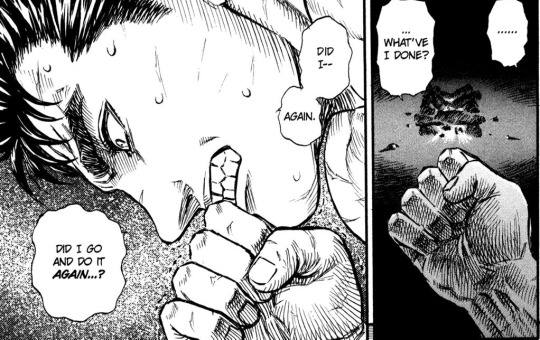

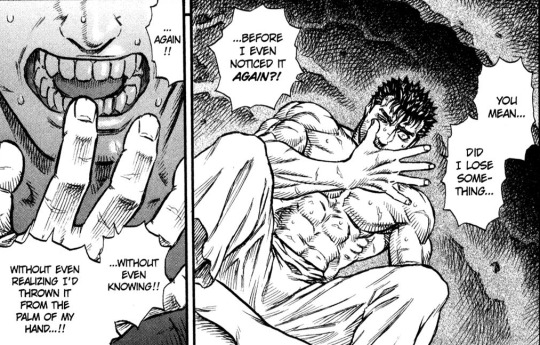
Again again again again. I’m starting here because it’s one of the most clear and straightforward examples of Guts viewing Casca as a replacement for Griffith. The connection is drawn explicitly - he considers abandoning Casca to be the equivalent of abandoning Griffith and drawing that parallel is what motivates him to save her.
But despite wanting to start atoning for past mistakes, he still intends to abandon her in a cave again after he gets her back.


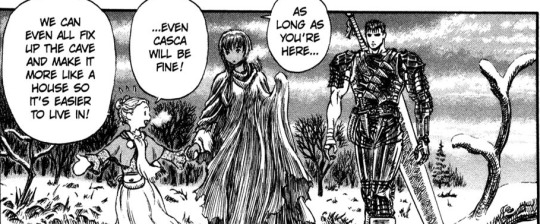

“Actually, I only half mean it.”
Cue this #iconic page:
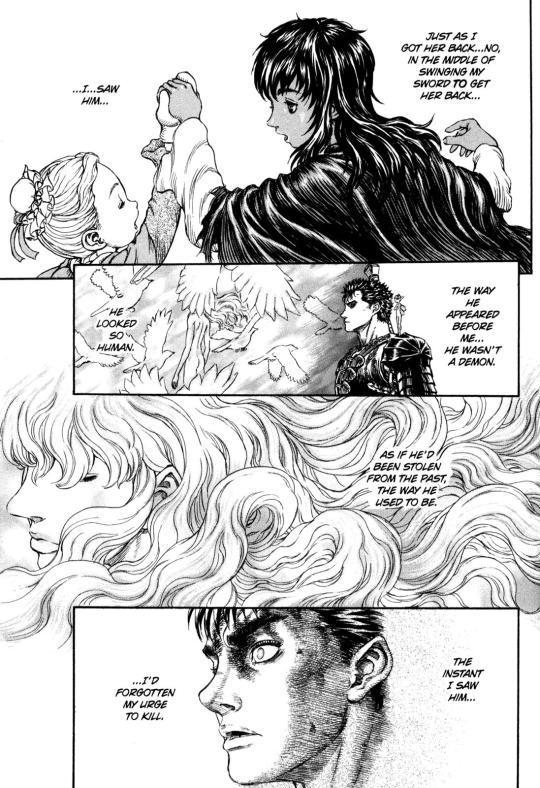
Now I talk about this page all the damn time because of how off the charts gay it is, but more importantly right now is that it draws a strong contrast between Casca and Griffith. It begins with “Just as I got her back... no, in the middle of swinging my sword to get her back...”
In the middle of getting her back... he... saw him. By framing Griffith’s appearance as an interruption that rips his attention away from rescuing Casca, Guts expresses the feeling that he’s torn between them. And of course he is, we see this throughout the rest of the manga, in his internal struggle not to toss Casca aside (or worse) and run after Griffith to, “give him... a heap of raw iron.”
We also see this inner conflict during NeoGriffith’s appearance when this happens:


But as of right now, Griffith has won the fight for Guts’ attention.

Guts’ half truth, as far as I can tell, is that he’s going to help make Godo’s cave a little homier and then take off again after Griffith.
As we saw in chapter 130 he decided to dedicate himself to getting Casca back, and we can assume that he fully intended to give up his revenge quest at that point. Godo tore him a new one over abandoning her to fight monsters, Guts realized he’s been being a dick, and he’s figured that maybe staying and helping take care of Casca is a better way of dealing with his issues than going back on a rampage, especially since last time he saw Femto he couldn’t even come close to touching him.
But then Skull Knight tells him the Godhand are going to be around, there’s going to be another version of the Eclipse, and we see Guts conflicted again:
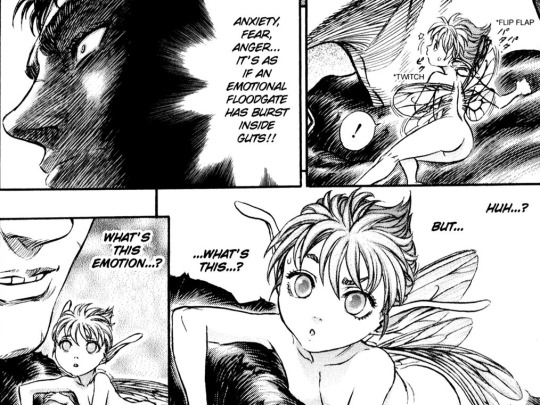
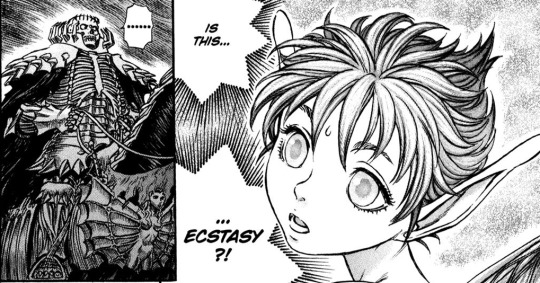

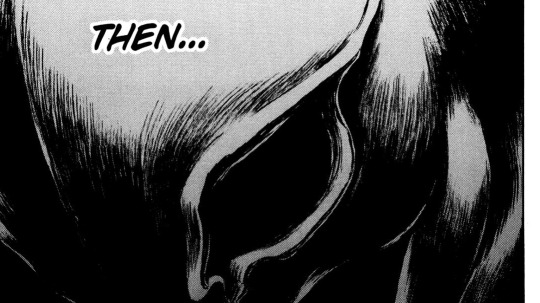
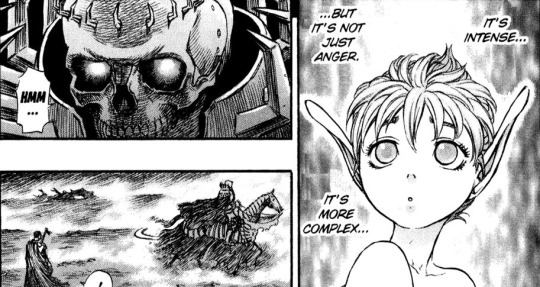
Anyway Isidro ultimately saves Casca, she and Guts are reunited, and Griffith appears. Maybe Guts’ original plan was to stay with Casca and forget revenge, but now Griffith is reachable, he’s on the same plane of existence, and to top it all off, he’s hot again!
And no I’m not joking, I absolutely think that Guts’ sexual attraction to Griffith is, for the first time since Promrose Hall, being clearly visually conveyed again. I already posted that iconic page in which Guts pictures Griffith’s ass and gets distracted from revenge, but there’s more where that came from.
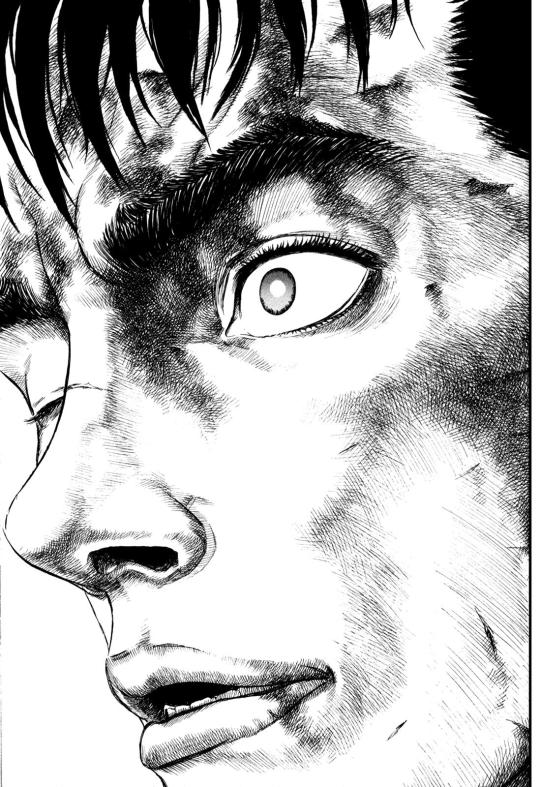




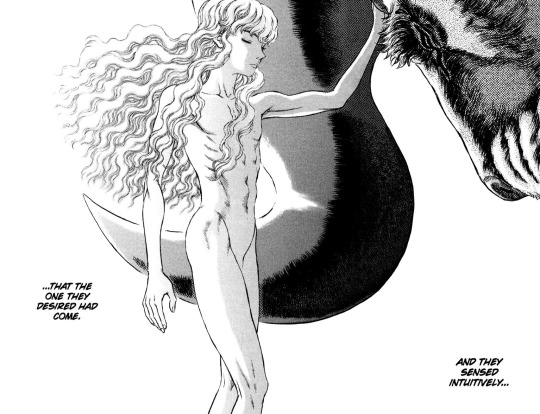
Griffith's sexiness is genuinely an important plot and thematic point lol, but it’s Guts eyes we’re shown that through, and holy shit does his gaze get a lot of attention in this scene. And why? Because Griffith’s reachable again. When he’s monstrous and demonic he’s out of reach on a whole nother plane of existence and shown as distant and untouchable:

When he’s incarnated as a physical being again he’s said to be “the desired,” he’s so beautiful no one can shut up about it, and imo Guts’ temptation to pursue him now that he’s “where [his] sword can reach,” is tied to the sexual temptation on display here.
Basically, while he’s certainly not intending to pursue Griffith so he can literally fuck him, there are blatant sexual undertones to his desire for revenge that ramp up hard and fast real soon, and they start with Griffith’s sexy as fuck rebirth.


And to elaborate on how the depiction of Griffith is a huge contrast here to the depiction of Casca:

Casca is shown at her least sexualized. She’s wrapped in a shapeless cloak and mirroring Erika, depicted as utterly childlike.
And this is Griffith:
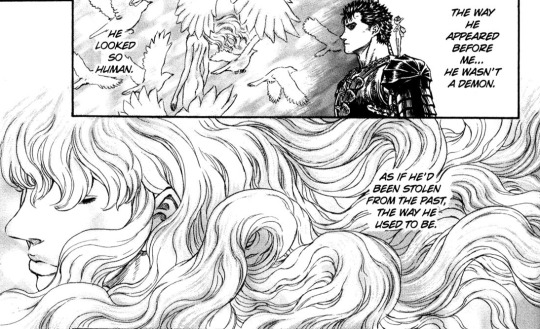
Griffith is the temptation, he’s the one Guts wants to pursue, and Casca is the responsibility, and this is shown loud and clear through Griffith’s intense desirability and Guts’ enthrallment at the sight of him vs Casca’s desexualized childishness.
As for the Hill of Swords reunion

“More like someone out of a fairytale.”

Not overly relevant but it’s a fun detail that “He was so pretty” is on Guts’ face while “someone out of a fairytale” is on Griffith’s image.

That sound - like Griffith’s apparent acknowledgement, at long last, is a physical blow. Love it.
But of course then Griffith’s like, I came to see you to test my capacity for emotion, and it looks like this whole emotionless demon thing was a success. And this is Guts’ reaction - not rage, or at least, not solely rage, but so much hurt too:

Look at those sad eyebrows man. This scene thoroughly shows us how emotionally conflicted and confused Guts is. He’s angry, he’s hurt, he’s full of longing both for revenge and for “the way he he used to be,” and after everything he still wants acknowledgement, he still wants Griffith to look at him.
“I’ll not betray my dream. That is all.”
And it’s now that Guts finally attacks. So far he’s let Rickert hold him back, then shoved him away only to scream “you don’t feel anything?!” instead of rushing him. But when NeoGriff tells Guts in no uncertain terms that his dream is not only more important, but his sole priority, Guts snaps.
I do think it’s really easy to read this scene as Guts looking for a hint that Griffith still cares about him, along with the hope that he feels regret for what he’s done. Guts had a lot of misconceptions about Griffith’s feelings, but by the time of the Eclipse he’d realized that Griffith loved him - he’d left to seek something (love and respect and affection, friendship and equality) he already had and, in leaving, lost it.
Scroll back up to that first picture I posted, he says it right there: “Did I lose something before I even noticed it again?! Without even realizing I’d thrown it from the palm of my hand!” There’s a small part of him that was still hoping, now that Griffith is un-demonized, that his heart and his love had returned with his human body, that it’s not lost forever. But in declaring that he’s free, NeoGriffith shoots that hope down.
Anyway big fight, cave collapses, Griffith’s heart starts doing shit unbeknownst to Guts, he mysteriously saves Casca and takes off, and Guts
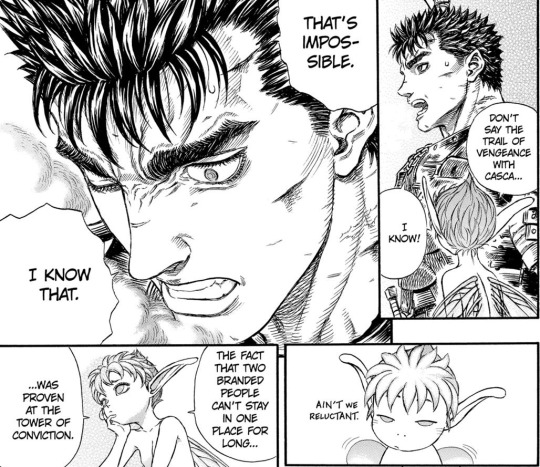
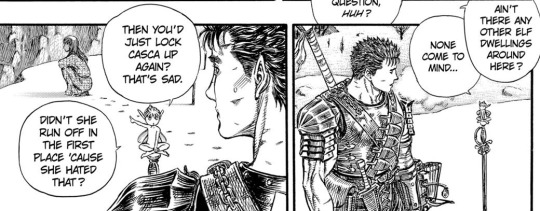
says he won’t abandon Casca again and decides to escort her to Elfhelm, with his dickish reluctance handily pointed out by Decent Person Puck lol.
Now look at this shit:

“Weren’t those Godo’s parting words?” Says Guts to Rickert to convince him to stay with Erika.

“You should have known. This is the man I am.”
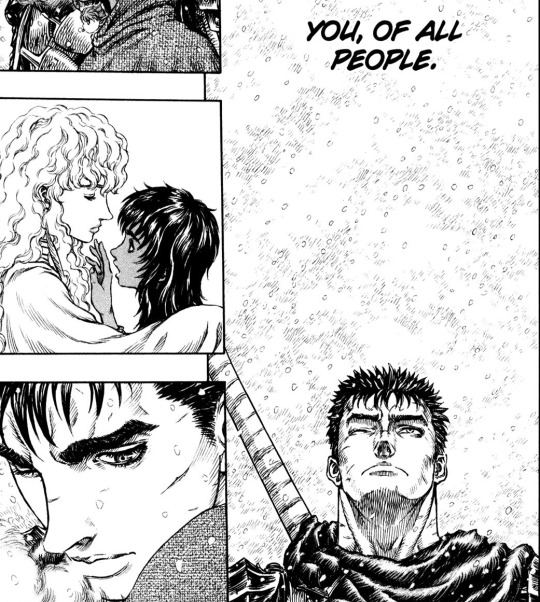
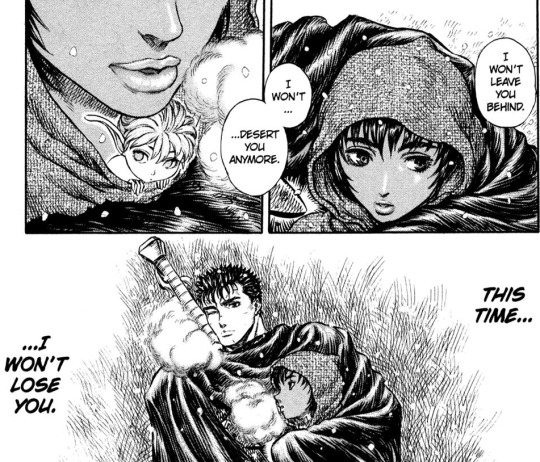
Don’t abandon what you can’t replace. He finally learned that lesson when he compared abandoning Casca to abandoning Griffith. He frames his choice to stay with Casca as making up for it. Guts once deserted Griffith, now Griffith has deserted him, so he’s promising not to desert Casca. Given that Guts’ mind is solely on deserting and being deserted by Griffith, as opposed to that time when he left Casca in a cave for two years and she wandered off, “I won’t desert you anymore. This time... I won’t lose you,” is given a double meaning of applying to Casca while also referencing losing Griffith.
But what’s with that interlude up there of Guts remembering Griffith saving Casca? The man Guts “knows” NeoGriffith is, the man who dgaf about anything except his dream, isn’t the man who would randomly decide to save Casca from falling rocks. Guts is shown thinking about that apparent contradiction immediately before “I won’t leave you behind. I won’t... desert you anymore.”
Taken all together, to me this scene comes across as so utterly Griffith centric that it makes Casca feel like an afterthought, conveniently there so Guts can take some form of action in response to his extremely Griffith-centred emotions.
Guts charlie brown walks away because Griffith “deserted” him. Guts draws a comparison between abandoning Griffith and abandoning Casca, and being abandoned by NeoGriffith and refusing to abandon Casca. Guts remembers NeoGriffith saying he knows what kind of man he is right before recalling him saving Casca.
Then he declares he won’t desert her again - and I have to wonder if part of what gives him the willpower to take a break from his revenge quest despite NeoGriffith residing so temptingly in his plane of existence now is the ambiguity of NeoGriffith’s actions here, casting “the kind of man” he is now into doubt and deflating Guts’ rage boner the same way he says seeing NeoGriffith looking “so human... the way he used to be” makes him forget his “urge to kill.” It hardly seems like a stretch given how much of Guts’ decision here is explicitly shown to be about Griffith.
So far, post-Eclipse, Casca’s been treated as a prop for Guts’ internal conflict between revenge and not being a dick - a symbol of his lingering humanity. She exists to be put into peril so Guts can decide to save her and then waver between her and Griffith. She’s the poster girl for failing to pass the sexy lamp test. It’s real depressing, and it’s about to get worse.
Enter Beast of Darkness.
Now we’re at the really bad shit, but also the actual most explicit verbal suggestion of Guts’ sexual attraction to Griffith, so it’s impossible to skip in a post on the topic. Plus there’s no point pretending that Casca isn’t done incredibly dirty by both the narrative and Guts.


It’s important to understand that the Hound is Guts. It’s not an evil malicious spirit trying to manipulate and possess Guts (which I have seen suggested before), it’s simply Guts’ dark emotions given substance. Just on the off chance this statement requires support for you, here’s a post on the subject. This scene is pretty much Guts arguing with his id.
And the way it’s framed with “dreams of him?” “let’s go to him” coming first on the image of an eager, excited puppy, followed by the teeth and “heap of raw iron” feels so deliberate to me. Guts wants violent revenge but it’s a feeling complicated by the fact that he loved Griffith, that he once strove to be his equal, to be considered his friend, and now he strives to kill him.
Like Guts facing Femto in the Black Swordsman arc, like Guts pleading for a shred of regret from NeoGriffith, there’s still an element of Guts wanting Griffith’s acknowledgement here.
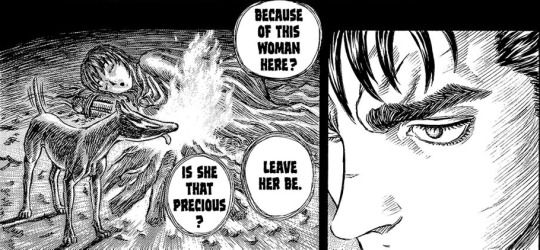
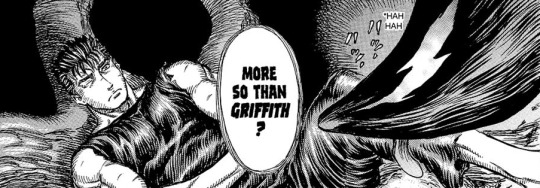
More direct comparisons between Casca and Griffith and how Guts feels about them. Who’s more precious, your love interest or your arch nemesis?

And I’m not here to say that Guts doesn’t care for Casca and only cares about Griffith. As this scene shows, he’s torn between them, but he’s chosen Casca now, and he’s trying to get his doubts and his rage and his suppressed attraction to Griffith that’s now coming to the surface, coloured by hate, to shut the fuck up. But these are his own doubts.
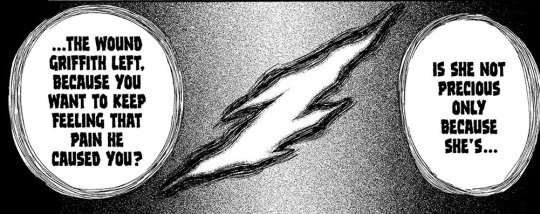
“The wound Griffith left, because you want to keep feeling the pain he caused you?” Okay, certainly an eyebrow raising description here but all right, this is about Guts’ motivation to kill Griffith. The Hound is suggesting he values Casca only as fuel for his rage. Which certainly seems like a relevant suggestion after Guts’ “I'd forgotten my urge to kill. And that... can’t be.” His rage needs fuel. So while that’s surely not all there is to his feelings for Casca, the Hound isn’t making shit up. Again, this is essentially Guts internally debating what his true motivations are.
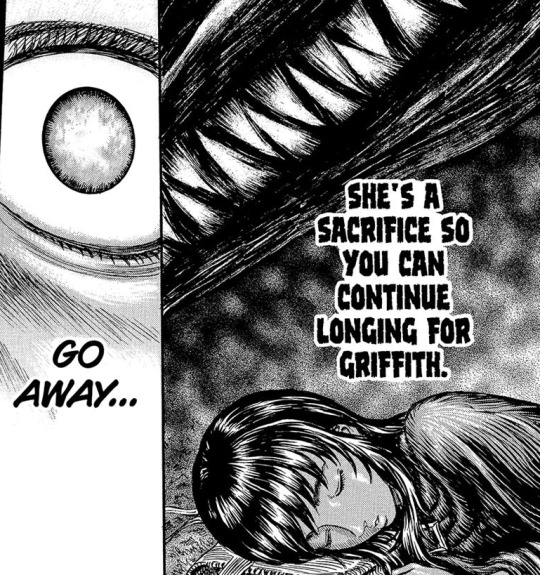
Longing. Hell of a word choice. Granted I can’t double check the translation with others because I’m incapable of tracking down old raws (tho I did a cursory search on skullknight.net to see if anyone had criticized the translation of this scene and didn’t find anything) but this is such a boldly romanticized choice of phrasing that I feel it’s safe to assume the undertones are there in the original Japanese. You don’t accidentally describe someone’s urge to kill a dude as “longing” for him. That’s a blatantly deliberate double entendre.
And on top of that it fits right in with the Hound’s first eager, excited words to Guts in this scene. Again, it’s an illustration that Guts’ vengeful feelings are complex, and intertwined with his original feelings for Griffith.

And then the Hound tells Guts to rape Casca so he can get closer to Griffith and I throw up my hands.
There’s so much innuendo and homoeroticism in the lead up to this (including earlier, w/ Griffith’s sexy rebirth scene and the reunion on the Hill of Swords, ft Guts thinking about Griffith’s ass), and then this scene just doubles down as hard as possible. “Let’s give him... a heap of raw iron,” “because you want to keep feeling the pain he caused you,” “she’s a sacrifice so you can continue longing for Griffith,” “you’ll get closer and closer to Griffith.” The innuendo in this scene makes it one of the most homoerotic scenes in the manga.
Like, tl;dr Guts’ vengeful pursuit of Griffith is tied so thoroughly to sex in this nightmare that tbh I have a hard time calling this subtext.
And while it is absolutely homophobic for one of the gayest scenes in the manga to basically tie Guts’ desire for Griffith to his desire for revenge and a suggestion to rape and kill Casca, it’s also worth noting that this isn’t exactly Guts’ desire for revenge being given a dark sexual element.
This is the Beast of Darkness using Guts’ pre-existing desire for Griffith to try to tempt him into sticking a sword in him. Still fucked up, obviously, but it’s at least deeper and more interesting than the alternative.
The earlier parallels I described, Guts comparing leaving Griffith and leaving Casca, etc, draw an emotional connection between Guts and Griffith through Casca as, essentially, a bridge. Guts is assuaging his desire to go back and fix his mistakes by replacing Griffith with Casca and refusing to leave her. Casca has become an outlet for Guts’ feelings about missed opportunities with Griffith.
This chapter draws a very direct sexual connection between Guts and Griffith through Casca as a bridge. By raping the woman Femto raped, Guts can get closer to him.
And it is, of course, not the first time the manga has done this. Femto’s unwavering stare into Guts’ eye(s) during the Eclipse rape scene isn’t subtle, though I don’t intend to go into it in detail as this is about Guts’ sexual desire, not Griffith/Femto’s. I feel like the stare (the fucking stare omg) speaks for itself.
I mention this only to make the point that there’s an established precedent for Casca bearing the brunt of these dudes’ repressed feelings for each other, whether it’s genuinely intended to be interpreted as repressed sexual desire or whether it’s meant to be platonic spite/longing to get closer and closer to Griffith no homo. It’s not fair, it’s bad writing on several levels, it’s both misogynist and homophobic, but there you go.
Ultimately my main takeaway here is that Berserk would be about 500x less fucked up and offensive if Guts and Griffith just cut out the middlewoman and fucked each other.
Okay, that’s enough of that. Let’s go back to the Golden Age.
So far I’ve done my best to show that, post-Eclipse, Guts’ relationship with Casca largely revolves around his feelings for Griffith, both regretful and vengeful, and the fucked-up sexual component of his relationship with her also relates to the sexual component of his relationship with Griffith. So what about pre-Eclipse? Does the same principle hold true then, back when Casca was an actual character and not just a plot device and projection screen for Guts?
And I would argue that it does. It’s less in-your-face about it, but tbh not by a whole lot.
Casca and Guts start off as romantic rivals for Griffith’s affection. Only Casca is aware of this, since Guts’ attraction to Griffith is subconscious and repressed imo, but that’s their early dynamic. Their first emotionally intimate scene together, when they finally stop hating each other and start to bond as friends, is when Casca tells Guts her backstory, which happens to be almost entirely about Griffith.
The Casca chapters end with Casca crying about Griffith having fallen in love with Guts and not her (”Why... why did it have to be you?”), but all Guts manages to get out of Casca’s story is that she’s into Griffith, so after he decides to leave he starts trying to be a good bro and set them up. Finally, right before Guts leaves, Judeau introduces him to the concept of hooking up with Casca.

During the course of this conversation Guts does a kind of 180:
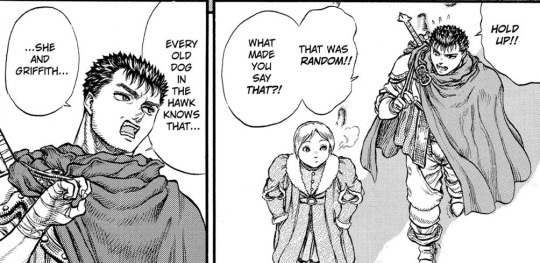
to
“The one who has her eye... is Griffith. That’s why... right now... I’m no good for her... like this.”
This is presented like part of Guts’ motivation for becoming Griffith’s equal is to be worthy of Casca, but we’ve seen his thought process for wanting to be Griffith’s equal, and Casca has never figured into it. He’d completely written her off before this chat with Judeau, as we see at the start, and he certainly never seemed to be consciously aware of the possibility of getting with her.
He’s been trying to set her up with Griffith for several chapters - pushing her into his arms, mentioning her dress to him, suggesting she ask him to dance, carrying her down to see him after Doldrey, saying “good luck with Griffith,” to her as he heads out, and now telling Judeau he expects them to get together.
There are three possible explanations for this behaviour:
1. Guts just wants to be a good bro and help his friends be happy together.
2. Guts is sublimating his unconscious desire for Casca into trying to hook her up with Griffith.
3. Guts is sublimating his unconscious desire for Griffith into trying to hook him up with Casca.
I think maybe Miura wants us to think it’s #2. Hence Guts’ awkward sweatdrop when Judeau brings her up, hence Guts complimenting her dress before mentioning it to Griffith, hence Guts carrying her down to him bridal style after Doldrey, hence Guts swiveling from “Less a woman I see her as... a comrade,” to “That’s why... right now... I’m no good for her... like this,” within seconds.
Yk, he’s subconsciously attracted to her now and acts on that attraction by trying to hook her up with Griffith to make her happy, but once Judeau tells him that’s not an option, he can admit that he’s attracted to her.
(And, just to throw something out there, once we establish that Berserk has subtextual, repressed sexual desire in this love triangle it only adds more validation to the other combinations. Even if we are genuinely meant to read Guts as unknowingly attracted to Casca, it puts unknowing attraction on the table. Who else might he be unknowingly attracted to? Casca also apparently took some time to recognize her feelings for Griffith as potentially romantic. Lots of subconscious desire wrapped up in this love triangle, I’m js. But lol I digress.)
That said, I’m here to argue that, whatever Miura’s intentions may be (and hell they may be exactly this), it comes across as option #3.
I’ve already gone through the first part of the Golden Age to highlight how Guts looks at him and how visuals suggest attraction. After Promrose, that fades away because Guts no longer views Griffith as reachable, rather, he puts him on a pedestal. Enter Casca, right at the point where Guts is deciding what to do with the “fact” that Griffith doesn’t give a fuck about him.
Suddenly he gets invested in setting Griffith up with Casca, who he views as more worthy of Griffith because she has a dream (be Griffith’s sword) and he doesn’t.

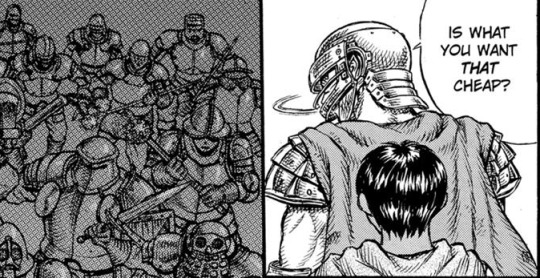
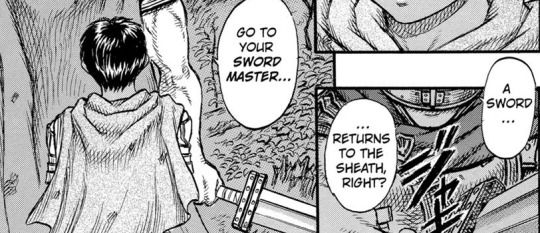


This is when Guts starts pushing them together. He’s encouraging Casca to take his place at Griffith’s side, whether he realizes the implications of that or not - at the very least he knows that Casca believes Griffith feels things for him she wishes he felt for her, even if Guts doesn’t believe that Griffith truly values him.
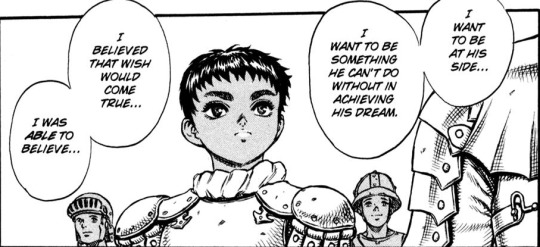
“Until that day. The day you showed up...”

What’s interesting to me is that Guts recognizes that Casca wants to fuck Griffith lmao. He’s hooking them up romantically, even though Casca never directly says she’s in love with Griffith, and only alludes to her feelings in terms of being pissed off at Guts for stealing Griffith away from her side.
Guts doesn’t believe he himself is close to Griffith after overhearing the Promrose speech, but he seems to realize that Casca is jealous of him, manages to interpret that (correctly) as Casca wanting to bone Griffith, and yet still doesn’t realize that Griffith’s feelings for him may be a lot more significant than he thinks. Feels like repression at work to me.
Guts wants Casca to take his perceived place at Griffith’s side, except Casca’s theoretically able to do so romantically bc she’s a woman, so there’s plenty of heteronormativity at work too, though whether that’s coming from Miura or Guts I can’t say.
So yeah after Judeau explains the plot of Berserk to him and keeps nudging him towards Casca, Guts agrees that maybe he could hook up with her... but only if he becomes Griffith’s equal first.
So the other way of looking at this is that, rather than suddenly changing Guts’ entire motivation out of nowhere from “become Griffith’s equal to be his friend” to “become Griffith’s equal to get with Casca,” and generally being bizarrely terrible writing, this instead neatly situates a future relationship with Casca, in which she sees him as just as good for her as Griffith, as proof that he’s on the road to achieving his goal of becoming Griffith’s equal.
Which holds true later on - Guts and Casca’s relationship is not an endgame for Guts, it’s not his goal, it’s another step. He still intends to go back out and keep pursuing his own dream. He’s still motivated by wanting to be Griffith’s equal.
So yeah, Judeau’s like, whatever, I tried, Guts ducks out, and shit proceeds to go down.
Fast forward a year.
Guts comes back. Casca, interestingly, has taken over Griffith’s most notable narrative role as leader of the Hawks. Everyone sits down around the campfire.
Rickert tries to explain things to Guts:



Look what Judeau does! He’s telling Rickert to shut up.
Judeau is... weirdly invested in Guts and Casca getting together. Setting them up is largely his motivation in the latter half of the Golden Age, as far as I can tell.
After this moment he changes the subject to:

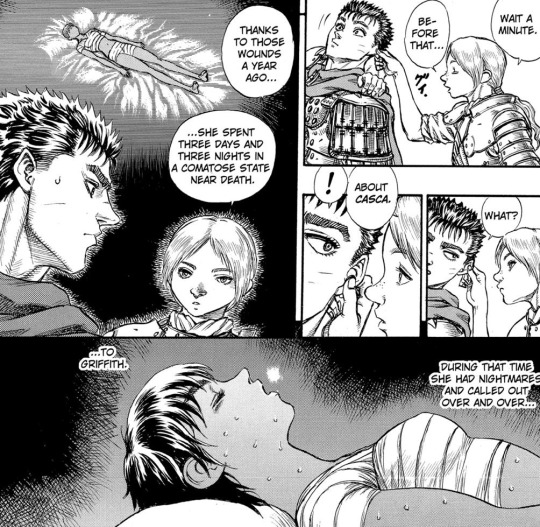

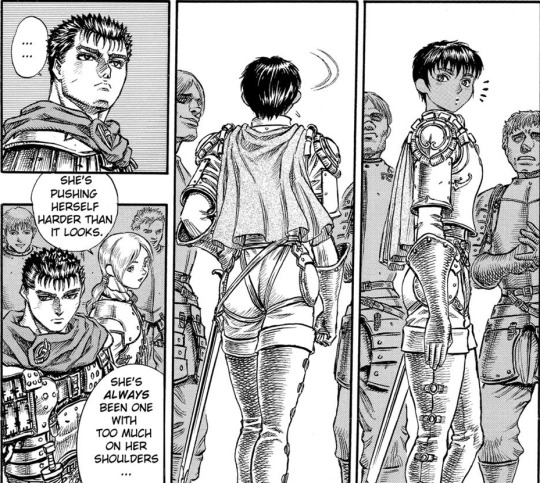
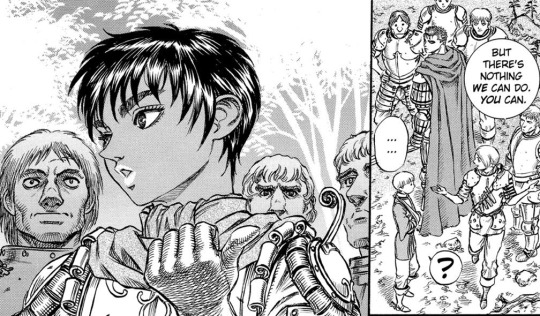
Subtle, Judeau.
I think it’s telling that Guts never comes up with the idea of hooking up with Casca on his own. He’s led to it by resident shipper on board Judeau, every time. The same dude trying to avoid any mention of Griffith’s feelings for Guts now. Why? Because he wants Guts and Casca to leave together after they rescue Griffith, and he has a feeling Guts won’t want to if he figures out how Griffith actually feels about him.
Whether by accident of slapdash writing by Kentaro I actually hadn’t planned for Guts and Casca to get together, you know — it just occurred to me partway through that it’d be more dramatic that way Miura or design, Guts’ interest in Casca comes across as pretty damn narratively forced to me, and the fact that Judeau has to be there to constantly nudge Guts in that direction doesn’t help.
Waterfall time!
Hey here’s something interesting about this scene:
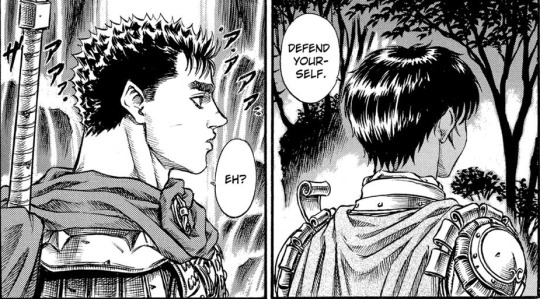


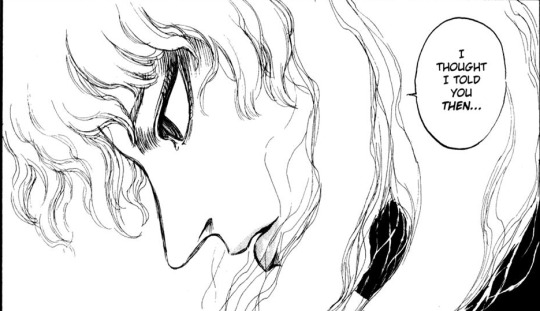



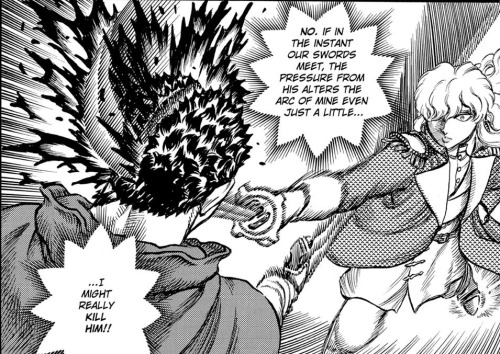

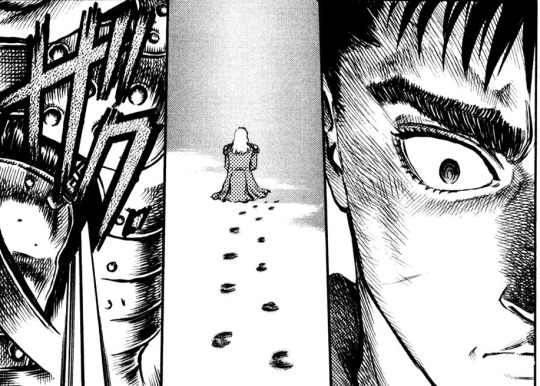
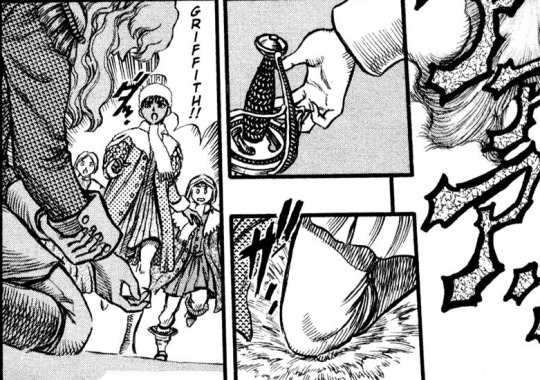

This is when Guts first starts trying to fix his mistakes by substituting Casca for Griffith, imo.
Casca attacks him while screaming that he ruined Griffith by leaving. As the point finally hits home, so does the point of Casca’s sword as Guts, shocked, lets her stab him.
Before Guts can really draw a useful conclusion from Casca’s diatribe, she offers a distraction from the subject at hand by trying to kill herself while bequeathing Griffith to him.
“I couldn’t be a woman. Or something invaluable. To keep on protecting the almost broken dream of someone who might not even be alive...“
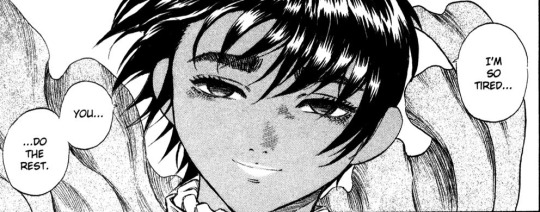
Guts didn’t save the last Hawk leader who had a self destructive breakdown after dueling him.
Presented with another person who seems to need him, who is desperate and lost and needs comfort, this time he does something.
And what really makes me believe this is actually, for real the correct reading of this scene - that, to Guts, Casca is a substitution for Griffith here - is that Casca is doing the exact. Same. Thing.
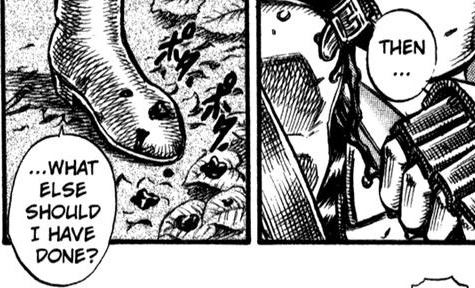






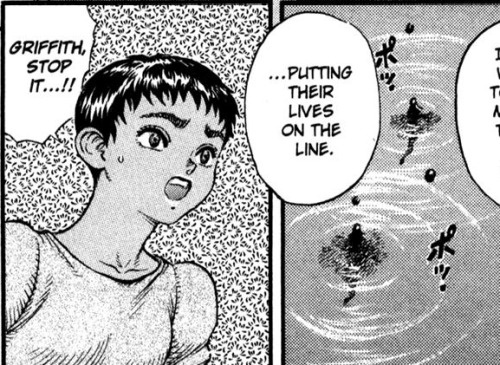


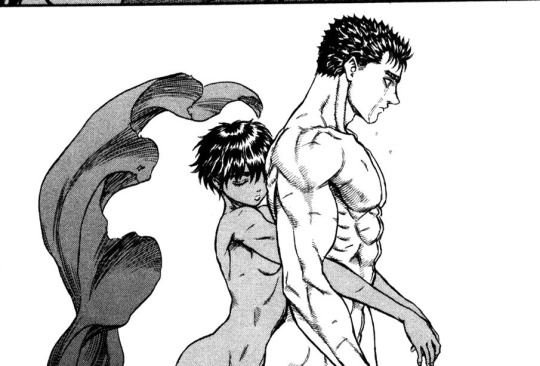

Griffith is (seemingly) unreachable, (seemingly) emotionally and romantically unavailable, but Guts and Casca aren’t.
And they kiss for the first time right after Casca tells Guts how Griffith felt about him, right after Guts lets Casca stab him because of it, right after the memory of Griffith kneeling in the snow, and the beginnings of the realization that by leaving he lost what he set out to earn, hit him, right after Casca tells him that Griffith is his responsibility now. It’s hard not to take that as Guts using Casca as a substitution for Griffith, giving her what he’s now very slowly beginning to realize he should’ve given Griffith.
Guts and Casca getting together here is two people obsessed with the same person trying to offer the other what they couldn’t offer him: comfort. And sex.
Once again a scene that looks like it’s going to be about Casca and Guts, that should be if this was a typical romance, turns out to revolve around Griffith.
And on the subject of Guts leaving Griffith in the snow instead of kneeling down and kissing him the way he responds to Casca much later, how about Griffith going out and getting self-destructively laid while thinking about Guts after the duel? Thematically there’s a very well-defined empty space where Griffith and Guts connecting romantically would’ve fit, is what I’m saying, but they didn’t. They both sought out other sexual connections to compensate for the loss of each other.
Finally, here’s the straightforward account of how Guts and Casca are feeling three days later with Griffith’s imminent return to their lives. Casca confesses to Guts that she’s still jealous of Charlotte, Guts gets pissy, but then thinks:

I hate that you’re still hung up on Griffith but I’d be a huge hypocrite if I got mad because I’m even more hung up on Griffith.
Which pretty much sums it up.
And I think I can stop there. There’s a lot more to say in the lead-in to the Eclipse about Guts’ intense feelings for Griffith, but when it comes to sexual attraction specifically, and how Casca figures into it, I think I’ll call it a day.
I hope I’ve made a decent case for Guts’ feelings for Casca, both positive and hugely fucked up, being largely built out of redirected feelings for Griffith. Whatever the reasons for this - actual authorial intent, intended redirection of Guts’s platonic bro feelings but adding sex bc Casca’s a woman so it’s obligatory without realizing how gay that looks, me totally reading into a half-assed het subplot created for the sake of more Eclipse drama, whatever - this is earnestly how Guts’ relationship with Casca reads to me.
In the final part I’m going to conclude this epic adventure in homoeroticism with what is essentially a “why I ship them,” going into why I think it makes perfect sense, from both a character and a thematic perspective, for Guts to be sexually attracted to Griffith. Stay tuned.
shout out to @mastermistressofdesire bc we’ve had a few conversations about this subject and some of your ideas really helped me coalesce these thoughts. Ty!
Part Four
#griffguts#a#tbh this is so long that i think i've wasted some good observations by burying them in this monster lmao#i might cannibalize this thing a bit later on and repost some of these ideas so they're more easily accessible#this is late bc i had a headache last night and didn't feel like editing it#b#theme: love triangle#ship: gtsca#theme: repression#theme: heteronormativity#scene: hill of swords#ship: griffguts#character: guts#theme: parallels#character: judeau#character: casca
239 notes
·
View notes